

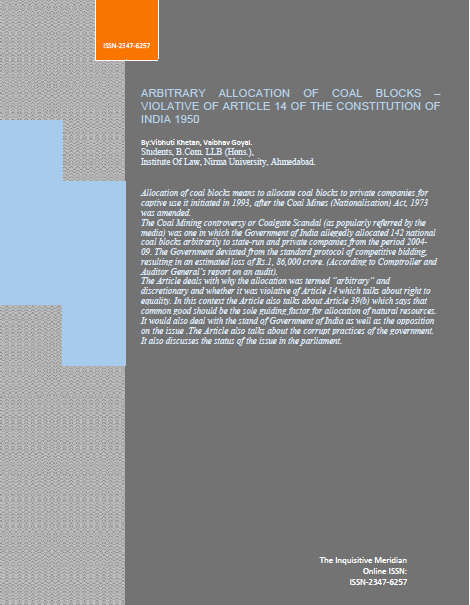
ARBITRARY ALLOCATION OF COAL BLOCKS – VIOLATIVE OF ARTICLE 14 OF THE CONSTITUTION OF INDIA 1950
By: Vibhuti Khetan, Vaibhav Goyal
Allocation of coal blocks means to allocate coal blocks to private companies for captive use it initiated in 1993, after the Coal Mines (Nationalisation) Act, 1973 was amended. The Coal Mining controversy or Coalgate Scandal (as popularly referred by the media) was one in which the Government of India allegedly allocated 142 national coal blocks arbitrarily to state-run and private companies from the period 2004- 09. The Government deviated from the standard protocol of competitive bidding, resulting in an estimated loss of Rs.1, 86,000 crore. (According to Comptroller and Auditor Generals report on an audit).

BALCO- Deciding the fate of Arbitration for years to come and bringing a new dawn for India
By: Ankit Yadav
On 6 Sept, 2012, the Indian Supreme Court delivered its much awaited judgement in Bharat Aluminium & co. v. Kaiser Aluminium Technical Services collectively known as BALCO Judgement. The 190 page BALCO Decision is likely to go down in the annals of arbitration as the watershed decision that heralded the new dawn for Indian arbitration. Since the international consciousness is that, India is arbitration unfriendly Jurisdiction and the main basic reasons being Delays plaguing Indian Court System and poor infrastructures that are demanded to be necessary.1 The Broad thrust of the BALCO decision is to protect the future from the erroneous and anachronistic decisions of the past and consistent with underlying philosophy and ethos of the NY convention and UNCITRAL Model Law, which is with the purpose of exhorting Indian Courts to became more arbitration friendly and thereby less prone to intervene in the arbitral process. Thus in the introductory part, the paper will discuss the background of the Indian Scenario and advent of arbitration related issues with special reference to Bhatia decision(2002) and the very (in)famous case White Industries case which was heard along with BALCO. And further this paper try to put forth and solve the strings which are attached to the tail of the decision and Also in the light of two papers published recently three errors & half-an error and English Arbitration Act, 1979. This paper will try to provide suggestions and answers to the question of applicability of BALCO, which is about to bring a new dawn for Indian Scenario in the field of arbitration and will decide the fate of arbitration for the years to come.
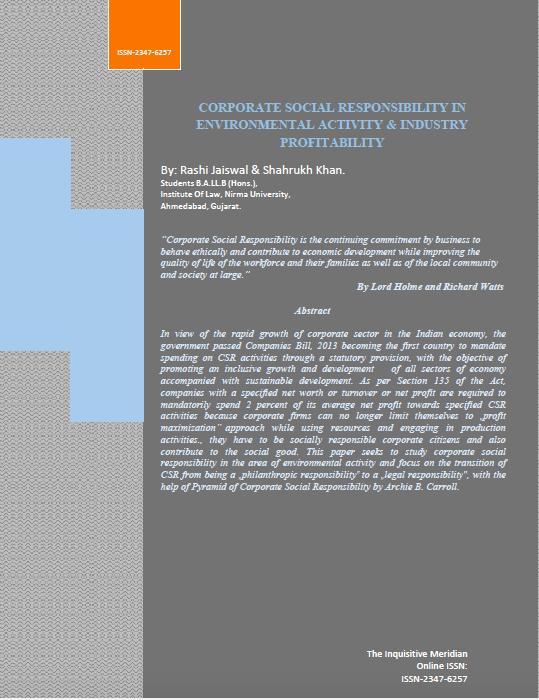
By: Rashi Jaiswal and Shahrukh Khan
In view of the rapid growth of corporate sector in the Indian economy, the government passed Companies Bill, 2013 becoming the first country to mandate spending on CSR activities through a statutory provision, with the objective of promoting an inclusive growth and development of all sectors of economy accompanied with sustainable development. As per Section 135 of the Act, companies with a specified net worth or turnover or net profit are required to mandatorily spend 2 percent of its average net profit towards specified CSR activities because corporate firms can no longer limit themselves to profit maximization approach while using resources and engaging in production activities, they have to be socially responsible corporate citizens and also contribute to the social good. This paper seeks to study corporate social responsibility in the area of environmental activity and focus on the transition of CSR from being a philanthropic responsibility to a legal responsibility, with the help of Pyramid of Corporate Social Responsibility by Archie B. Carroll.
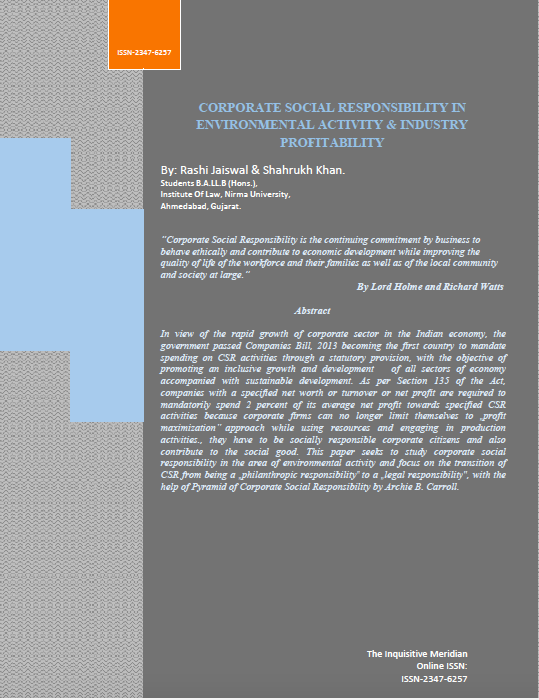
By: Anshuman Swamy
This essay deals with the history of the state of Jammu and Kashmir and how the Indian constitution has been slowly integrated in the state. Various historical events have been mentioned that have helped in formulating the constitutional provisions for the state of J&K. The essay starts with the introduction of basic history of the state, such as, the origin of the state and the rulers who ruled the state and then it tells about the events that occur after India’s independence and highlights the conflict between India and Pakistan regarding the state, the state’s accession to India, application of the Indian constitution to the state, the autonomous position of the state and lastly the Kashmir accord (1974) which established the Indian governance over the state.
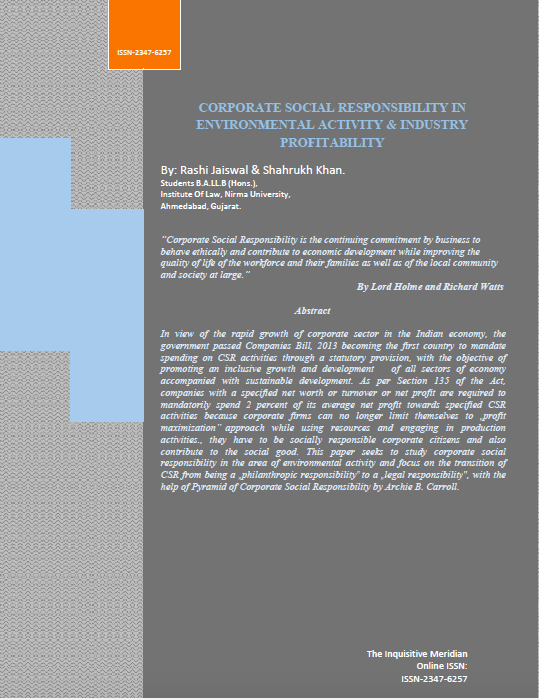
Author: Harsh Rathore
Steel Fiber Reinforced Concrete is a composite material made of hydraulic cements, water, fine and coarse aggregate, and a dispersion of discontinuous, small fibers. It may also contain pozzolans and admixtures commonly used with conventional concrete.Because of the vast improvements achieved by the addition of fibers to concrete, there are several applications where Fibers Reinforced Concrete (FRC) can be intelligently and beneficially used. This paper basically deals with discussion of SFRC and the very sources of inception of Fiber Rienforced Concrete. Furthermore, paper is devided into different parts which involves breif discussion about each and every aspect related to FRC’c focusing on SFRC mainly. In the last part of the paper various conclusions that has been put forwarded by various research scholars and from the author itself has been portraied.

Author: Shantanu Dwivedi
With around 12 million outlets, India has the largest density of small shops in the world. The unorganized retail sector is around 97% of all retail sales. Corporate retailers plan to grow the share of organized retail from the current 3% to approximately 15-20% in four years by investing more than $25 billion, of this 60-65% of all investments will go towards food and grocery retail in setting up the supply chain, which means direct corporate investment in agricultural Wal-Mart is the largest corporation in the world. Their annual revenue of over 350 billion is larger than the entire Indian retail market. They are currently banned from entering into India, but are trying to come in through the back-door by signing a Joint Venture with Bharti Enterprises (Airtel). They have not yet signed the deal. They must be stopped. A study by Kenneth Stone of Iowa State University found that some rural towns in the USA lost 47% of their retail trade after the opening up of a Wal-Mart.

Author: Jyoti P. Patri
Censorship in India is an emerging issue which has become debatable too. Some opine that it prevents the freedom of speech and expression whereas some think that it is necessary as it prevents the telecast of violative materials like vulgarity, obscenity, nudity and any other harmful material which affect the values of life. Through this paper I wanted to show both the Positive and Negative aspects of censorship and its major role in the fields of Music, Books, Internet, Newspapers and Movies etc…
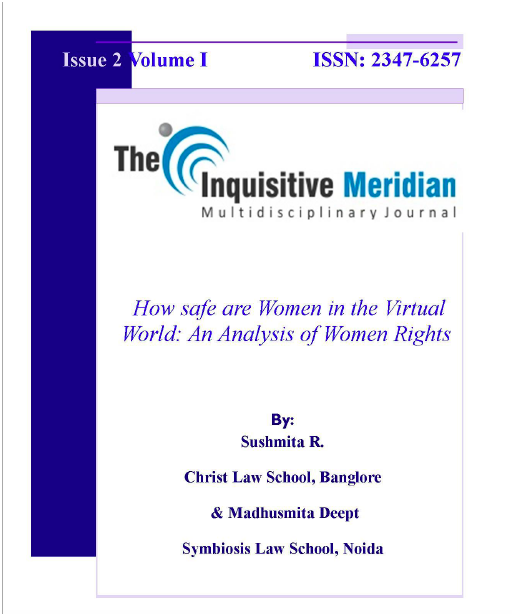
Author: Sushmita R. and Madhusmita Deept
The trivialization of harms suffered by women is nothing new. Society ignored or downplayed domestic violence’s brutality for over 200 years. No term even existed to describe sexual harassment in the workplace until the 1970s, despite the pervasiveness of the practice. In light of this history, the current refusal to take seriously the cyber harassment of women is as unsurprising as it is disappointing. A large number of women hesitate to use the cyber space owing to the fear of being stalked online or victimized in the virtual world. Cyber-crime indeed has become a cause of concern in the current scenario. If it continues unabated, cyber harassment could very well be the central front of struggles against sexual harassment in the coming decades given our increasing dependence on the Internet. In this view, the paper seeks to examine the various legislations around the world with regard to cyber stalking, voyeurism and morphing. This research study does in depth of all the three cyber-crimes, discusses what are they, why are they done so, who can be the victims and how can the culprits be punished.
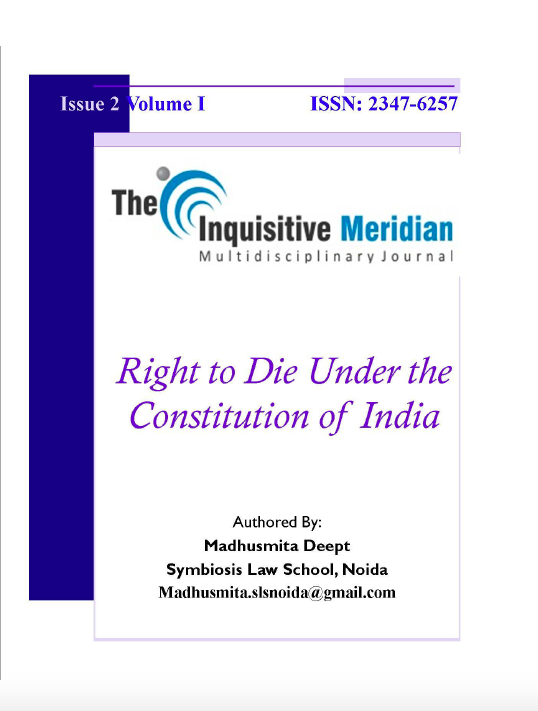
Author: Madhusmita Deept
In this project secondary research methodology has been used. Hence it has no primary source of data. Analysis is made by interpreting Bare Acts, books, laws, journals, articles online and in newspaper, online websites, etc. The interesting part is that we all are the stakeholders for this research study. As being born we all have a Right to Life but the discussion here is how many of us have Right to Die?

Author: Rajashree Bhowmick
Women have always been an open book for men. The codified laws and punishments for the benefit of women have yielded results though on a shorter note. The Delhi Gang Rape Case was a waking call to the Indian Judicial System which in turn replaced the word ‘Rape’ in Sec 375 of the Indian Penal Code, 1860 to ‘Sexual Assault’ through the Criminal Law Amendment Act, 2013 by J. Verma Commission thereby increasing its ambit. The word ‘Sexual Assault’ is basically derived from two root words: ‘Sexual’ meaning any activity relating to sexual desire of a human being and ‘Assault’ meaning any activity posing a threat of getting harmed or injured within one. Acts like penetration of penis or any object or any part of the male body within the vagina, mouth, urethra or anus of any person, application of force or touching private organs constitute ‘Sexual Assault’. Indian Laws on Sexual assault have become more stringent than ever. On the other hand, the definition of ‘Rape’ has been extended beyond penile vaginal penetration to all forms of non-consensual penetrative sexual acts by men. Thus various sexual offences, their punishments in the present context of the Indian Penal Code and ways of social upliftment will be discussed in the paper with the path of reformation to follow in the context.
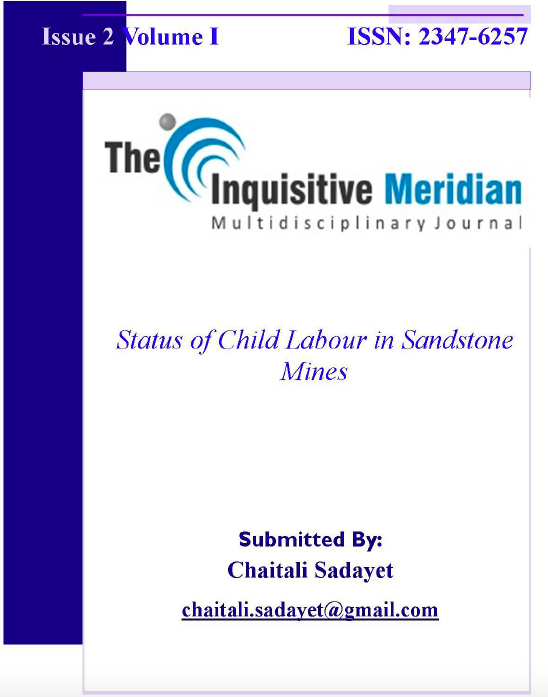
Author: Chaitali Sadayet
Childhood is being in a tender age when you don’t care of anything, when you play, when you live. But does this childhood have any relevance to the children working as child labourers? The term “child labour” is often defined as work that deprives children of their childhood, their potential and their dignity, and that is harmful to physical and mental development. Child Labour is concerned to employment of children below the specified legal age. Due to certain forces and circumstances children are compelled to work in the early stages of their childhood. Work that exploits children and interferes with their education & unsafe working conditions frequently cause injuries or illnesses in children and is seen as a social problem. Poor children are picked up by the owners of factories, mines, dhabas and industries in which they are forced to work in the hazardous environment. This research paper tries to reflect the condition of child labour in sandstone mines and how the meaning of childhood drifts apart from their lives while running in the race of survival.
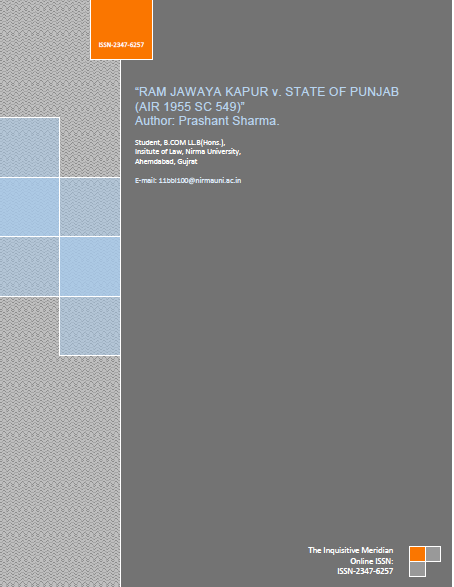
Author: Prashant Sharma
In the State of Punjab, all recognised schools had to follow the course (of studies) as approved by the Education Department of the Government. For a long period of time prior to 1950, the method adopted by the Government for selection and approval of text books for recognised schools was commonly known as the alternative method. Books on relevant subjects, in accordance with the principles laid down by the Education Department, were prepared by the publishers with their own money and arrangements and they were submitted for approval to the Government. The Education Department after proper scrutiny selected certain number of books on each subject as alternative text books, leaving it to the discretion of the Head Masters of the different schools, to select any one of the alternative books on particular subject out of the approved list. Authors, who were not publishers, could also submit books for approval and if any of their books were approved, they had to make arrangements for publishing the same.

Author: Rishab Kumar
The COVID-19 pandemic has prompted extraordinary demands and price instability for specific items, as well as fluctuations in firms’ expenses. As firms battle to deal with these changes, organizations are forcefully looking to show they are forestalling consumer protection. Governments are exploring dependent on a wide range of instruments, including competition rules, consumer protection law, and & price gouging restrictions. Thereby, in such a scenario, it becomes necessary to remain significantly more cautious (with respect to the advisory issued by CCI for businesses in the wake of Covid-19) than in ordinary occasions if there is a danger of virus profiteering. This Foreword tries to assist the businesses by exploring the rapidly developing challenges of the COVID-19 pandemic. It initially sums up the guidelines on “exploitative” abuse of dominance in India by addressing the inherent problems associated with “excessive pricing”- one of the grey areas under the Competition Act. Second, it portrays the implementation steps that organizations are taking during the pandemic. The author endeavors to explain the troubles experienced by the Indian competition authorities in determining excessive pricing by setting a benchmark value, which is contended to be beyond the competence of competition authorities solely. Towards the end, the author has dissected the unsatisfactory quality of the “one size fit for all” approach and recommended the requirement for more regulatory measures in the presence of individual sector regulators in India.

Author: Dr. Kavya H.B. and Riya Merin Biju
The COVID-19 pandemic, shattering millions of human lives, has caused unfathomable damage to the global economy as the businesses across all sectors (tourism, hospitality, manufacturing, start-ups, real estate) were collapsed after the restrictions (lockdown, self-isolation, international travel ban) imposed by the government to curtail the spread of the virus. Many companies are facing a financial crisis as businesses are not running in a fully-fledged manner. The production capacities of various firms were declined due to the disruption of supply chains and the shortage of capital. Consequently, a large number of people have lost their jobs which in turn may gradually drag the whole nation to poverty. However, though it has suffered at the beginning of the outbreak, the global economy is now bouncing back to normal with its innovations and strategies. Digital technologies have played a paramount role in the revival of the global economy as most businesses are now managed through online platforms. Further, it has extended its impact on all sectors including healthcare education, and even household.
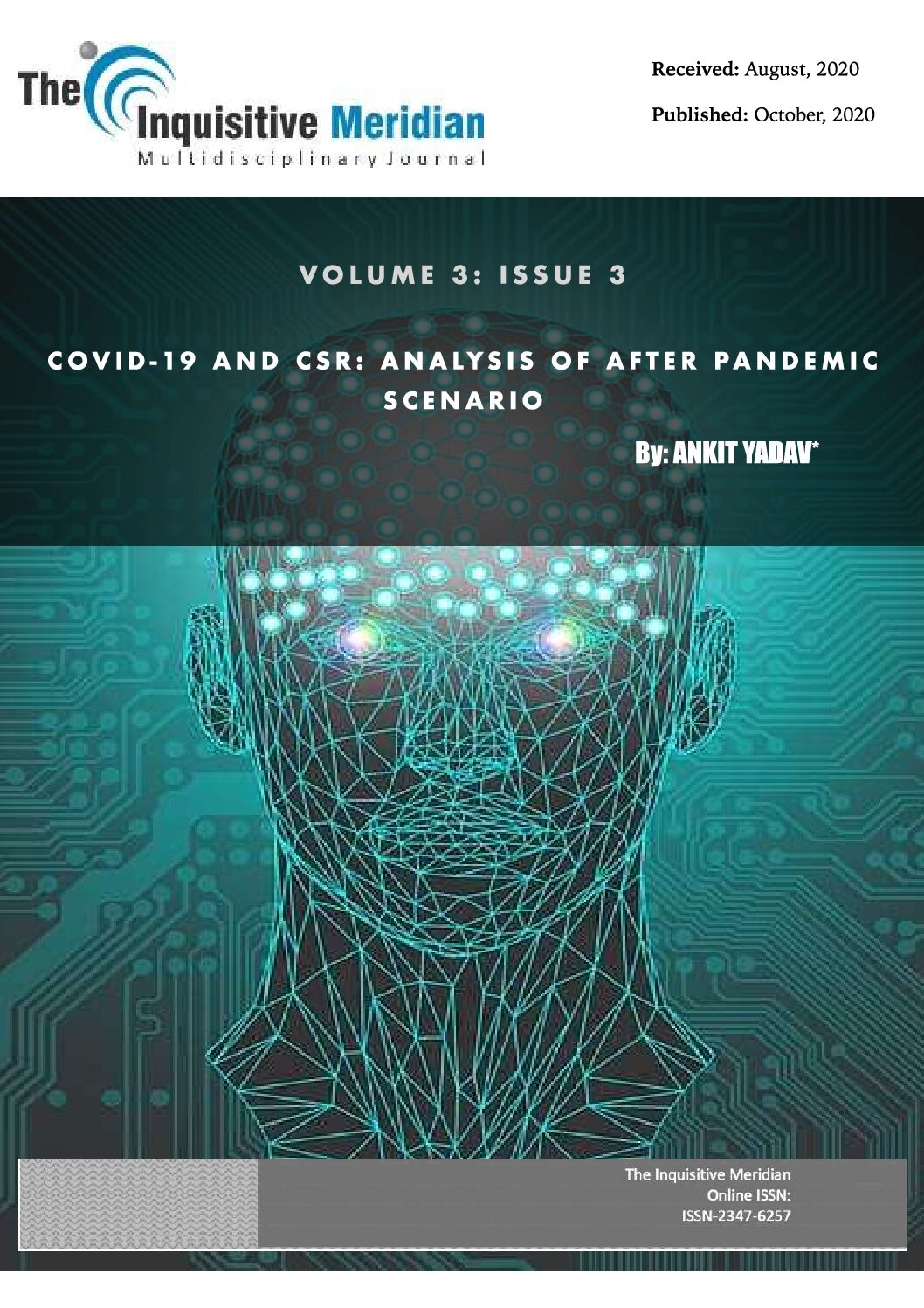
Author: Ankit Yadav
The primary purpose of corporates is to earn profit. Entire economics centered academia believes that money multiplication is a motivation for the business. But there is another theory which believes that business entities operating around the world are responsible juristic citizens, hence they shall share social responsibilities along with economic progress, especially near their operating environment. In India, businesses were involved in charity since time immemorial and even today some big industries like TATAs are owned trusts which are largely engaged in philanthropic activities. The new companies act known as Companies Act 2013, provided mandatory CSR contribution in terms of money for the companies registered under it. During the difficult times of COVID-19, there is an unprecedented situation where businesses are pessimistic towards the future and due to fiscal pressure government ought to cut short its expenses. The low revenue inflow and high outflow will force the government to reduce its infrastructure expenditure which is essential for a growth-oriented and stable economy. In this situation, corporates can share the responsibility of certain expenditures and relieve the government to utilize those funds towards infrastructure. Hence, this will be mutually beneficial for both stakeholders. This article discusses the impact of COVID 19 over CSR expenditures as well as over corporates, the sector-wise scope of CSR contribution along with a brief introduction of CSR, and newly introduced regulations and amendments by government.
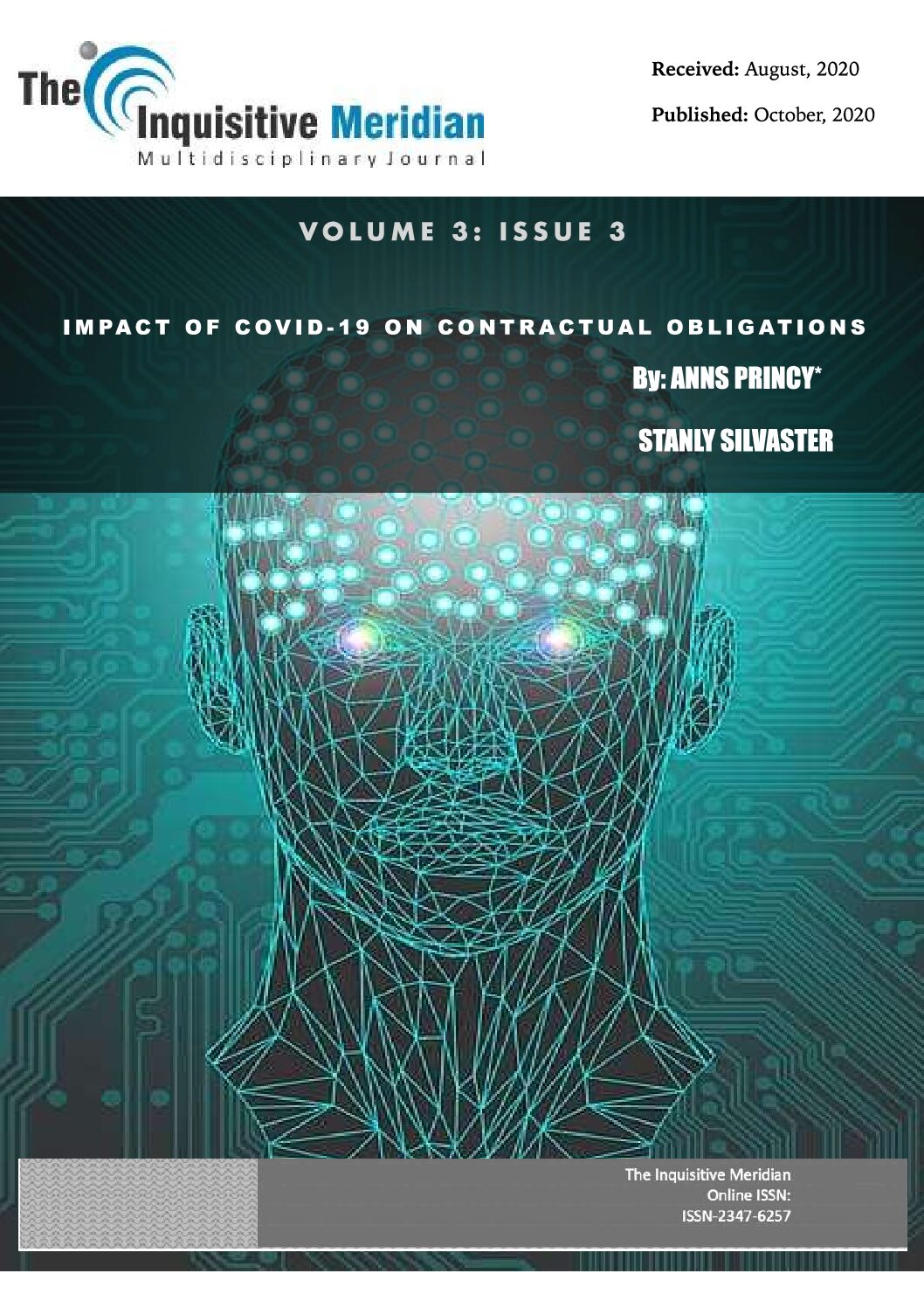
Author: Anns Princy and Stanly Silvaster
COVID-19 has caused worldwide unprecedented disruptions to business operations and the commercial turmoil continues. The pandemic has primarily impacted the ability of companies around the globe to maintaining operations and perform their contractual obligations. In light of the situation at hand, companies are finding ways of mitigating, if not escaping the inertia brought forth on contractual obligations. The unanticipated coronavirus has interrupted our personal, professional, financial and commercial lives, to a point of preventing best performance at all levels, so much so that it has rendered performance impossible. This article focuses on impact of Covid-19 on performance of contracts, governed by Indian law and possible remedies to it.
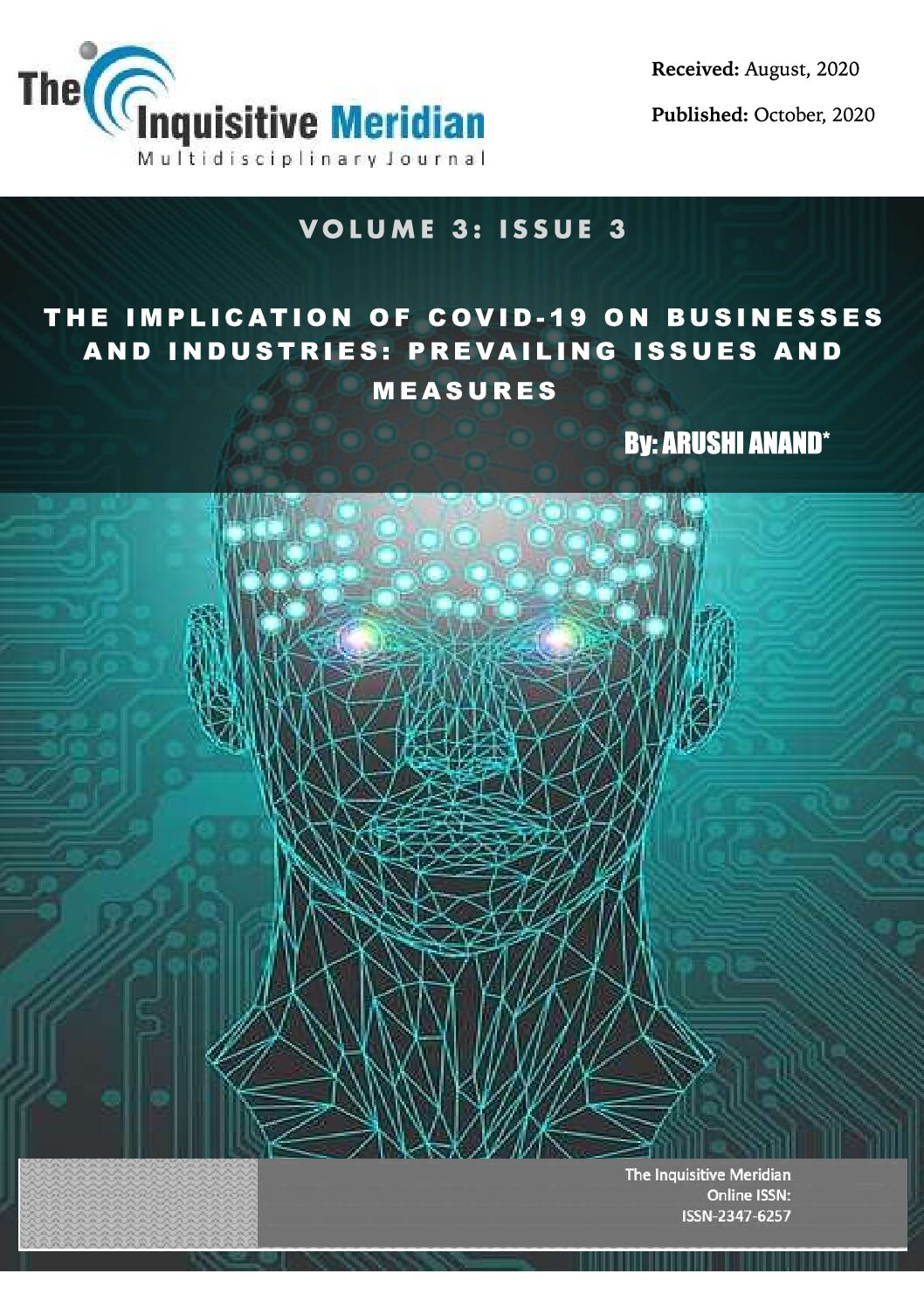
Author: Arushi Anand
COVID-19 has hit hard several businesses around the world. It has caused a major downfall in the economy. This paper discusses several businesses and the impact COVID-19 has caused in its functioning and how it has made them do a shift towards online medium. It specifically talks about the small businesses that essentially operate on less cash flow and have to work through social distancing norms. It moves to the tourism industry which seems to have suffered a lot in regard to the ongoing pandemic and crisis. It also talks about the transport industry and the impact on the construction industries. It also talks about retail sector and the effect on its business. These are analysed by looking at the complete pictures of the circumstances present related to the lockdown and social distancing measures and the effect on it because of that. At the end, the paper suggests some measures to be undertaken by the business as well as the aid to be provided by the authorities for smooth functioning and to not lead to the downfall in the economy. The paper ends with a conclusion pointing out the impact and the steps necessary to cope up with it.
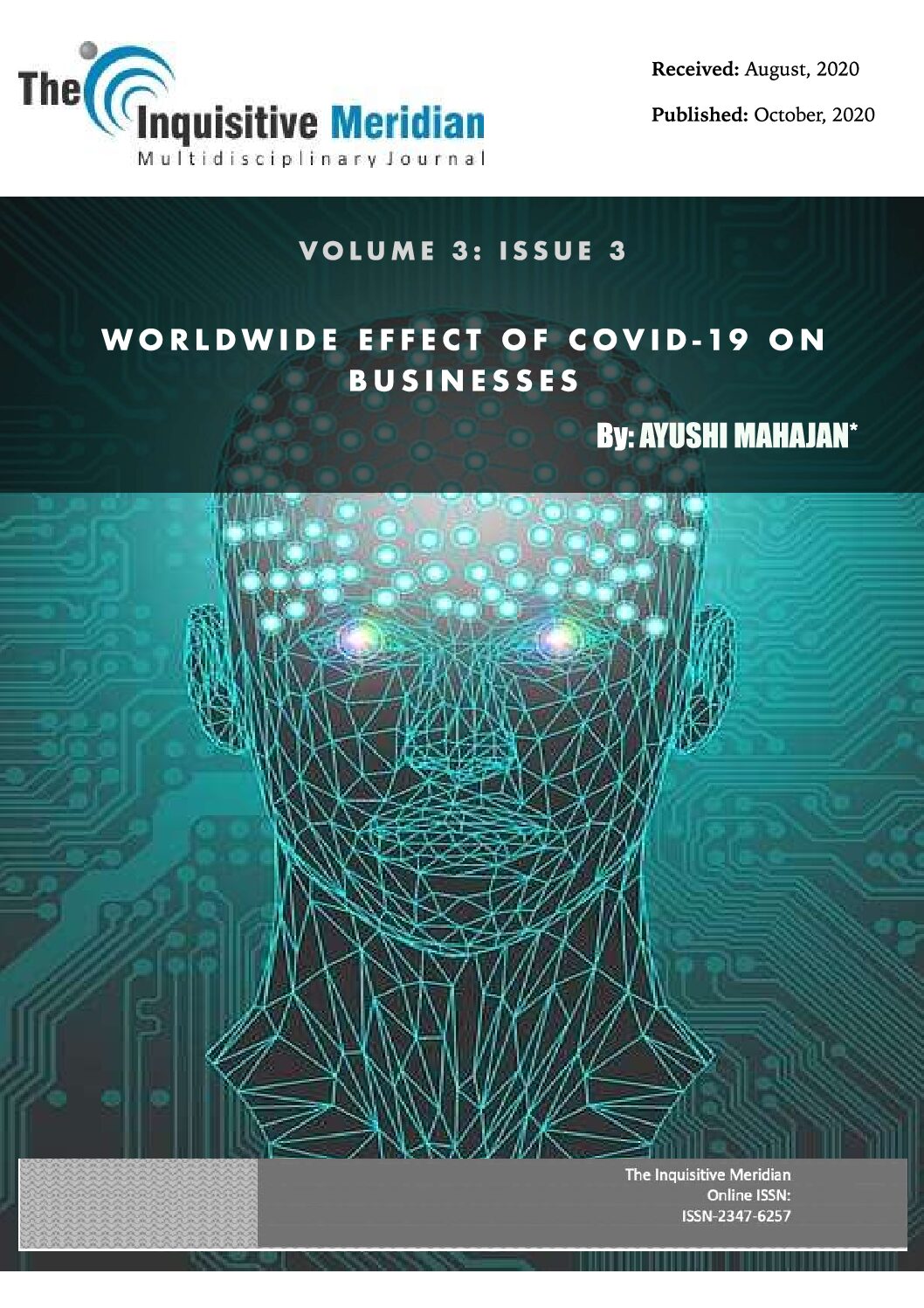
Author: Ayushi Mahajan
None of us has ever assumed that a disease outbreak will initiate a pause in our day to day activities. Even in 21st century with a vast range of advanced medical facilities, it is all transparent that how did a health crisis translate to an economic crisis. Why and how did the spread of coronavirus bring the global business and economy to its knees? The answer to this question lays in two methods through which coronavirus stifled business activities. First, the spread of the virus encouraged social distancing which led to the shutting down of the financial markets, events, corporate offices and ultimately the businesses. The second reason could be the exponential rate at which the virus was spreading and the heightened uncertainty about how bad the situation could get, which led to more safety measures in consumers and investors and international trade partners. The initial outbreak of the coronavirus in China disrupted global supply chains. A record of 3.28 million Americans have filed for unemployment benefits in the week ending March 21 as coronavirus induced layoffs surge in and around US. Even when the short – term affects end, the long term business and economic impacts will ripple for years. Companies and businesses that are taking major hits at the beginning of 2020 due to the rapid spread of coronavirus and the result6s of various surveys shows that 86% are expecting revenue to take the significant falls due to direct impact of the pandemic outbreak. And from that 86%, 33% are predicting a revenue fall of more than 15%, 21% believe that their business revenue will fall within 10-15%, while another 33% expects that their revenue will fall 10%or less. The significant drop in revenue will have a trickle down effect on the economy as the companies are struggling to adjust their business strategies in preparation for an economic downturn.
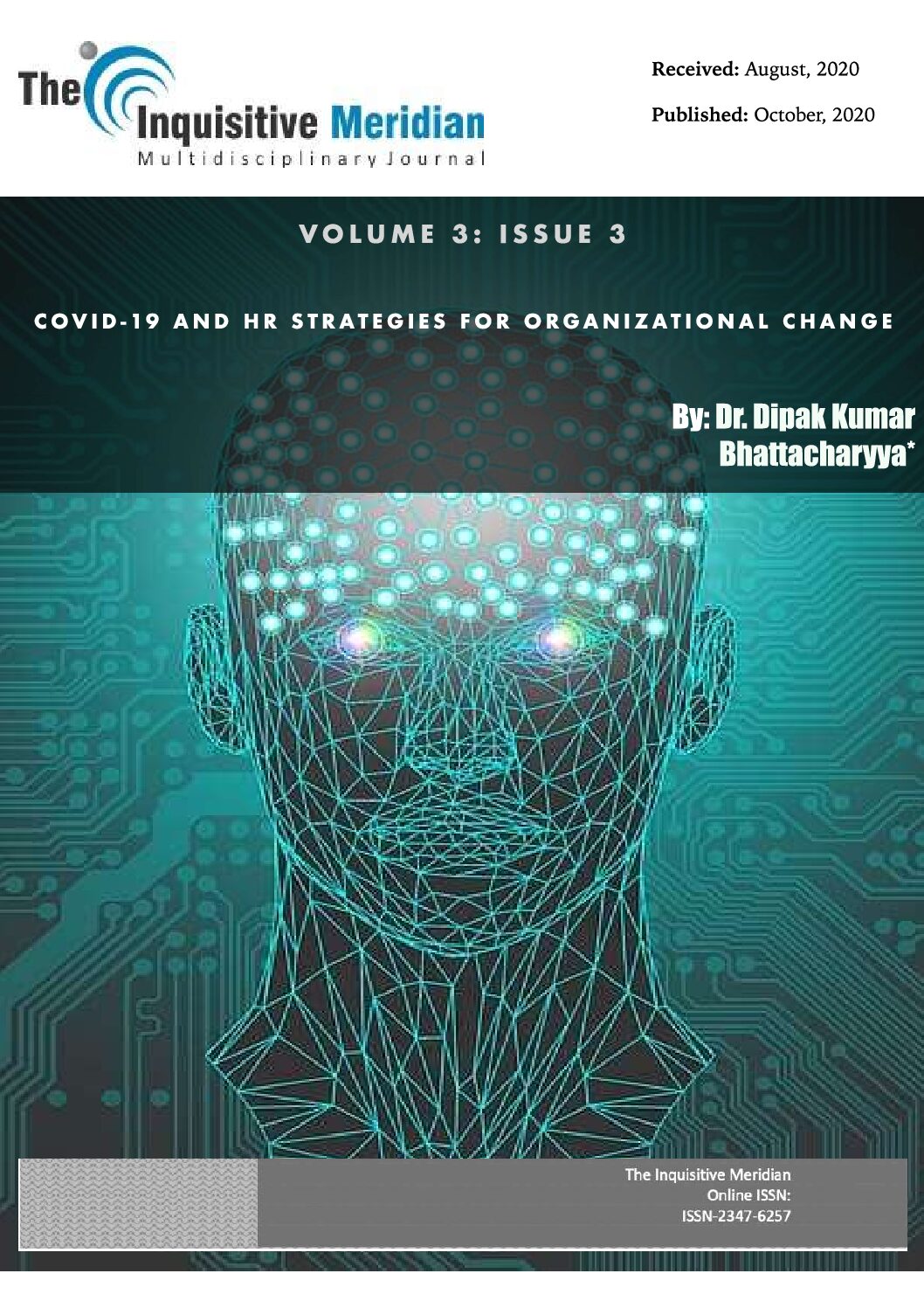
Author: Dr. Dipak Kumar Bhattacharyya
Covid-19 disrupted the way organization works. It will continue its disruption till medical science comes out with some miracle vaccines or medicines. Work from home (WFH) is now the order of the day. Managers’ interactions with employees are now virtual. HR today needs to calibrate the way it functions. Take for example; our HR now needs to recruit top talent in digital marketing. Virtual interaction with the potential candidates may weaken this selection process. Indian organizations’ compensation and benefits plans traditionally laid more emphasis on fixed component part. Lockdown cannot help them to optimize such costs for those who are unable to work from home yet need to be paid. Some organizations can reduce such costs by sending their employees on leave without pay. This has been done by many organizations. Some are managing by truncating a significant percentage of variable compensation components. But in both the cases, these organizations are creating opportunities for their rivals to hire their employees. We do not have data on cross organizational movement of people in pandemic situation, but certainly this figure will be alarming. Imagine what will happen to such organizations, which resorted to those practices, when lockdown is eased, and we are able to manage Covid-19. Irrespective of nature of such organizations, they will suffer from the crisis of manpower. Even for organizations engaged in low skill manual jobs, manpower problem will spark, unless re-migration takes place. Already some traditional sectors like jute mills, construction, etc., have reported non-availability of workers, as they migrated to their states. Similar predicament is now being faced by FMCG companies. These companies fared well in pandemic situation, but now unable to meet their production requirements for non-availability of their workmen. Such workers will take time to forget their woos of lockdown period; when their organizations left them uncared without food, shelter, and even not paid their due wages. We will not wonder, if future business model of many organizations can make best use of such workers, who left for their hometowns, locating their operations proximate to the source of labour. Such apprehension is not unfounded, rather based on facts. ILO’s Director General, Guy Ryder (April 2020) also expressed concern on labour market efficiency. Post Covid-19 days, we foresee the surge of labour problems for general reluctance of migrant labourers to get back to their previous places of work. Think of poor governance of labour migration. In many places we have even witnessed gross human rights violation. Absence of any institutional mechanisms in such a situation of crisis sparked many untoward incidents. Problem is not only in India, it even encompassed international organizations, which had perennial dependence on migrant workers, or to be more specific on expatriates.This paper first outlines important challenges for HR in pandemic situation, and then based on the practitioner experience and theoretical underpinnings, recommends six-pronged strategies for HR functions, in managing change, both for the sustenance of the organization and for the HR profession, per se.
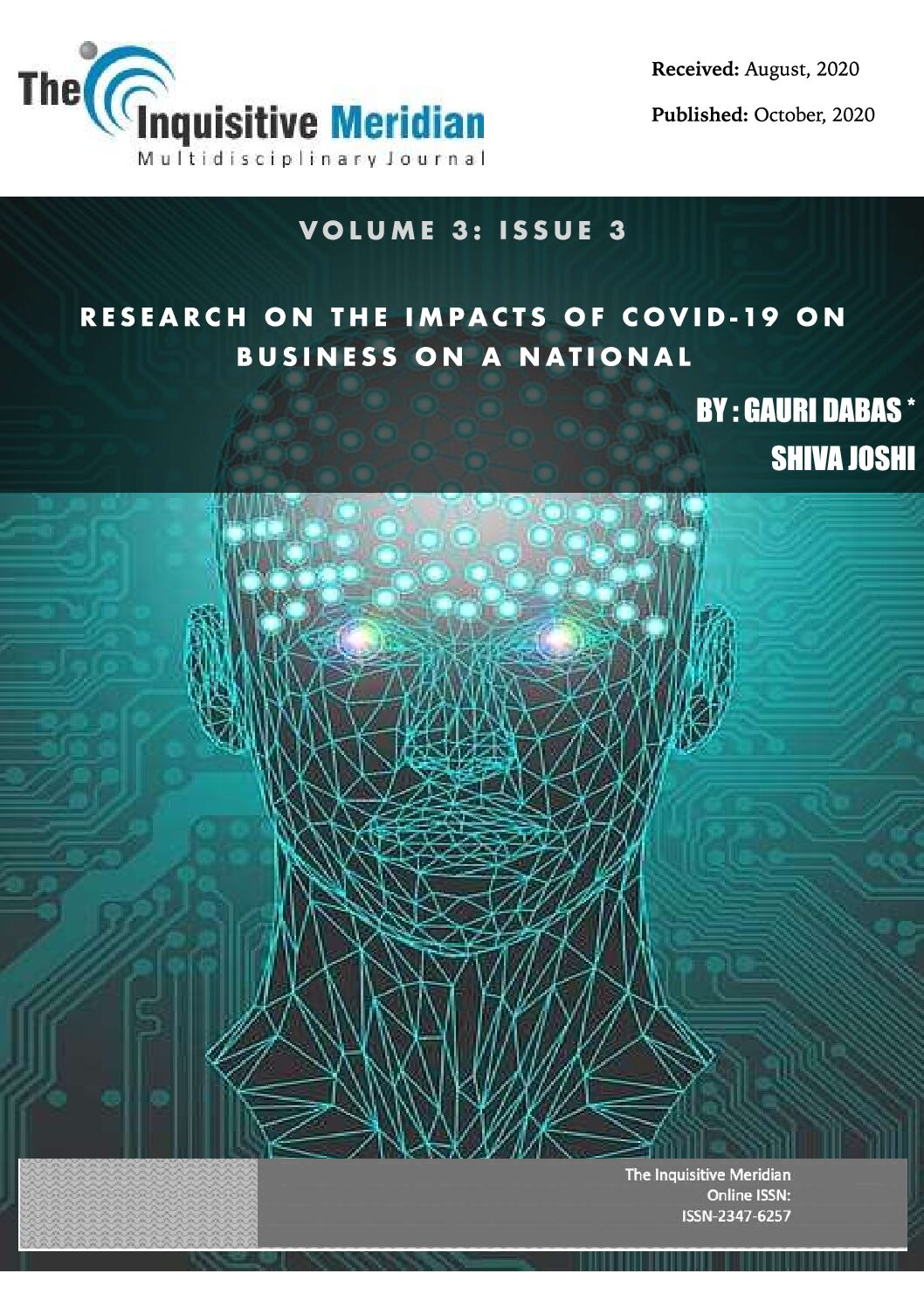
Author: Gauri Dabas and Shiva Joshi
The Impact of this global pandemic on the economic sector on various Nation States, as well as on the International community as a whole has been grave and so, it is necessary to view this topic closely and with great speculation as to form a coherent solution. This paper includes the history of COVID-19, the impact on various sectors relating to business, statistical as well as theoretical information regarding the impact, as well as our hypothesis upon what may become a solution for the revival of Local Markets as well as the International Economic Community. Upon viewing the Impact of this widespread pandemic on a Micro level, we see that it has been quite disruptive in its wake. In India’s Fourth quarter of its fiscal year, the growth of the country has gone down significantly and notably, India had also been witnessing a pre-pandemic slowdown. Along with this, small scale businesses have had to suffer quite a lot, while large scale businesses on the other hand, are much stable. Coming onto a broader point of view, there has been an unprecedented collapse in the first half of 2020 – an almost 13% decline in global GDP. Furthermore, the costs to the global economy are taken from support packages, through central banks and fiscal actions and are seen to be very significant and likely to have long-lasting and complex effects on management of sovereign and corporate debt. Lastly, apart from the major Social impacts of this pandemic, probable solutions have also been suggested in this paper, taking the Local Economic revival of the Markets into perspective.

Author: Mugdha Shree and Mehal Kaur
The World Health Organizations (WHO) confirmed on 12 January 2020 that a novel corona virus was the cause of respiratory illness in Wuhan city, China. Since then, the decease has been declared a pandemic and has spread unabated, particularly in the global north. India has reported its first case of Covid-19 on 30 January. The transmission escalated from then and spread across the entire Indian Subcontinent, with most cases linked to people with a travel history from affected countries. Due to this reason the Government started taking steps to control this. Physical distancing, personal hygiene, and use of face masks were emphasized and are widely practised, with remarkable compliance. The government started total lockdown in India. The Government has introduced and implemented a series of innovations including a novel smartphone application called Aarogya setu for contract tracing and aiding in quarantine and related containment measures.
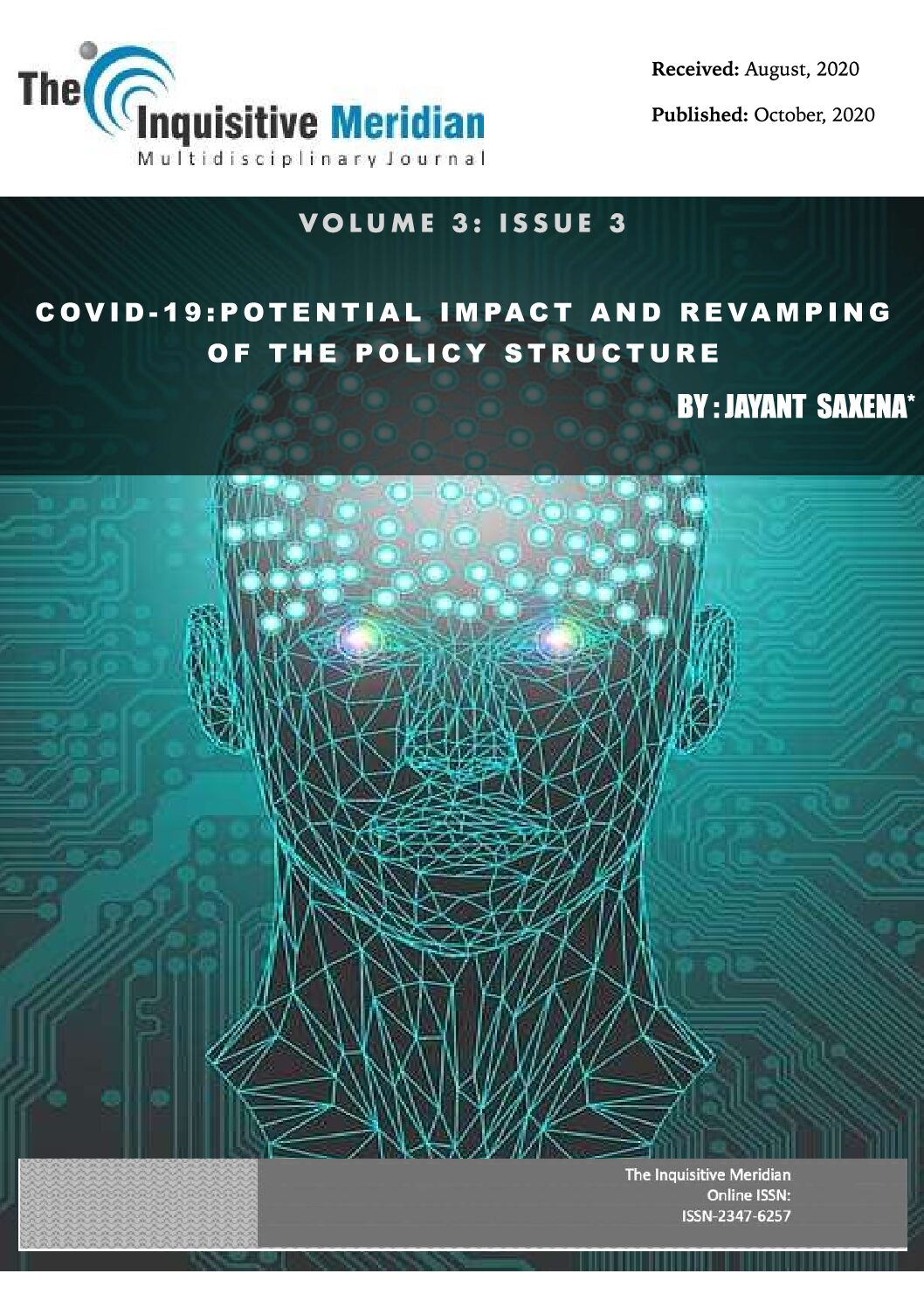
Author: Jayant Saxena
The purpose of the below study is to capture the idea by elucidating the ramifications which have occurred due to the unprecedented crisis of the pandemic (COVID-19). The Government has successfully managed to alter the legislations, to attenuate the losses which have shaken up the backbones of many in respect to their occupation. Moreover, the study holds the audience with the efforts undertaken by the government in the context of safeguarding the interests at a larger scale. On the contrary, contraction in the growth of the Indian economy is not an easy challenge to be dealt with, which, however, is quite evident from the measures initiated by the government, where businesses and enterprises seem to somehow manage to keep their métier steady. The analysis summarizes major steps opted by The Security and Exchange Board of India (SEBI) providing adequate relaxations for the entities to function at a steady pace, along with which, a brief scope of clauses which can be seen triggering a lot amidst this pandemic i.e. Force majeure and Material Adverse Change (MAC), is too addressed under this study. Furthermore, amendments by Insolvency and Bankruptcy Board of India (IBBI) into the Insolvency and Bankruptcy Code (IBC) and by Ministry of Corporate Affairs (MCA) into Companies (Share Capital and Debenture Amendment) Rules, 2020, are covered along with the above analysis. As time passes by, the re-opening of the market is a necessary task to enforce for the revival of an economy and with that, managing and administering the impact of COVID-19 has to move on a parallel path. There is nothing more paramount than tackling unfavorable prevailing current economic conditions of the market which is consistently leaving the unwanted long-term impact on society.
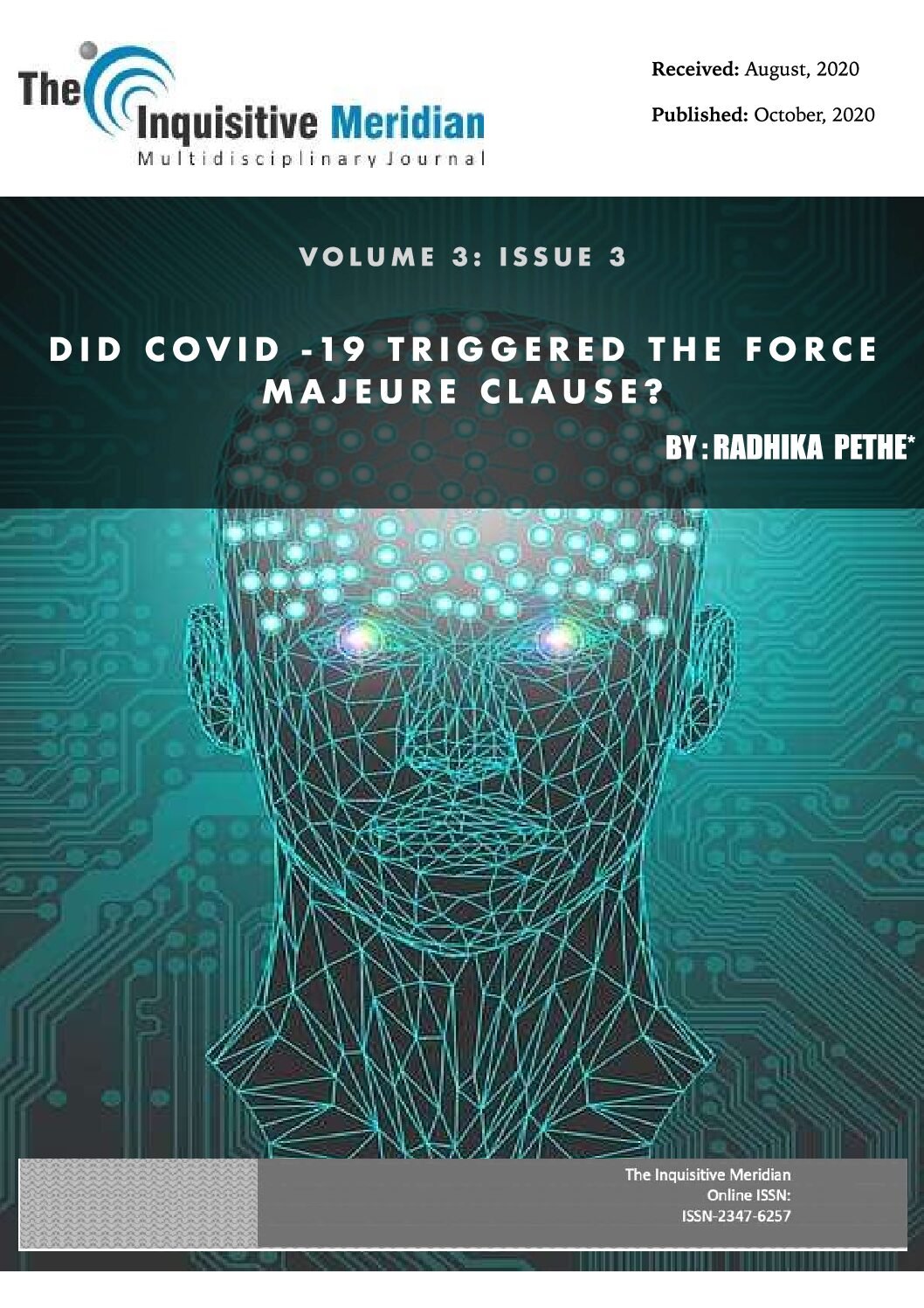
Author: Radhika Pethe
COVID 19 The global concern does it actually triggered the FORCE MAJEURE?. The researcher has dealt with this specific question by connecting to some other research questions. Starting with the introductory part of force majeure and doctrine of frustation , the research includes , applicability of force majeure , how it is important by the perspective of covid 19 etc. The researcher has used doctrinal method of research by going through some articles, blogs , etc. The goal of the researcher is to make one understand that in this harsh times every business needs the force majeure clause. The design of the research covers the major research questions and answered them properly with an understandable explanation.

Author: Satvik Mishra
This paper brings in light the trending topic of Indian Startup Ecosystem and the government’s initiative for the same, ‘StartUp-India’. It starts by introducing Startup as a businees concept and how it has contributed to the nation’s economy. It talks about problems faced by new and existing startups ranging from capital procurement to marketing strategies. It further goes on to talk about how the Indian Economic Environment be a fit place to run a startup ad the opportunities it presents. The paper critically analyses the ‘StartUp – India’ scheme and how it has helped in the development of home-grown startups by providing legal and financial resources as well as the required expertise. It further analyses the impact of the COVID-19 pandemic on the economy and how startups can help revive the same once the situations start turning normal, alongside suggesting the specific sectors for investors and venture capitalists to target.
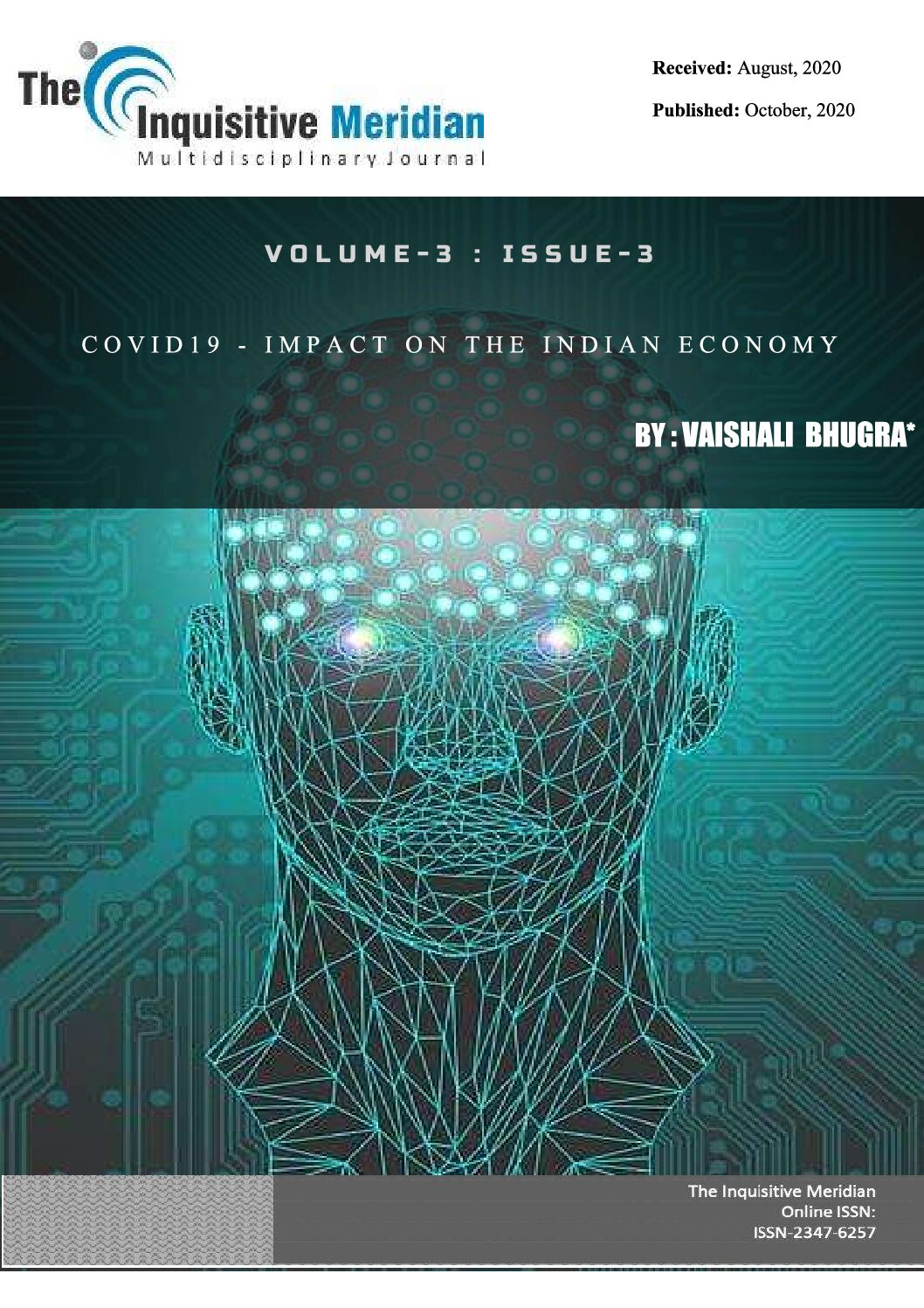
Author: Vaishali Bhugra
The outbreak of the covid-19 pandemic is an unprecedented shock to Indian economy. The economy was already in a parlous state before Covid-19 struck. With the prolonged country-wide lockdown, global economic downturn and associated disruption of demand and supply chains, the economy is likely to face a protracted period of slowdown. The magnitude of the economic impact will depend upon the duration and severity of the health crisis, the duration of the lockdown and the manner in which the situation upfolds once the lockdown is lifted. The state of the Indian economy in the pre covid-19 period, assess the potential impact of the shock on various segments of the economy, analyse the policies that have been announced so far by the central government and The Reserve Bank of India to ameliorate the economic shock and put forward a set of policy recommendations for specific sectors.
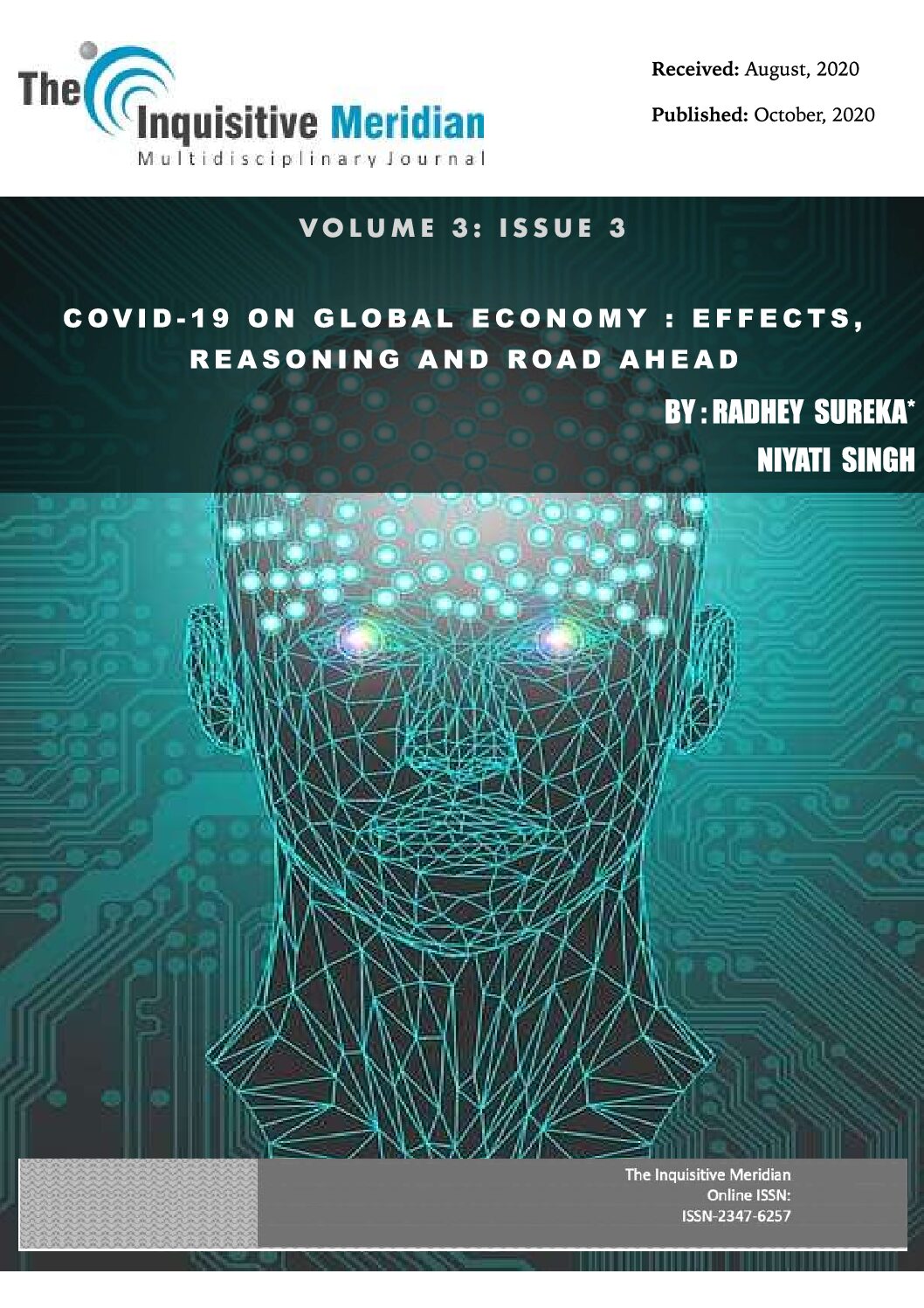
Author: Radhey Sureka and Niyati Singh
Within a few months, a pandemic that was caused due to a microscopic virus has today affected 188 countries and taken more than 7 million lives. This unforeseen altercation of routine life in a technologically advanced century has not only induced fear among general population, managing to confine the world within four walls, but has also served as a radical challenge for the global economy. Today’s CEOs are navigating through uncharted waters. Successfully navigating these challenges may not guarantee a promising future, or any future at all. This is because once we get through this pandemic, we will emerge in a very different world compared to the one before the outbreak. It is hence very important to not only recover from the loss that this pandemic has inflicted but also adapt to future trends and new market scenario. Every industry has been impacted due to COVID-19, while the magnitude of the impact may vary from sector to sector, there are some industries that have suffered the most and continue to suffer. Then there are those industries that have achieved growth trends which they could never imagine, like in the case of IT, pharmacy and health sectors. On the other hand, there are industries like tourism and hospitality that have slim to no chance of recovery in the near future.
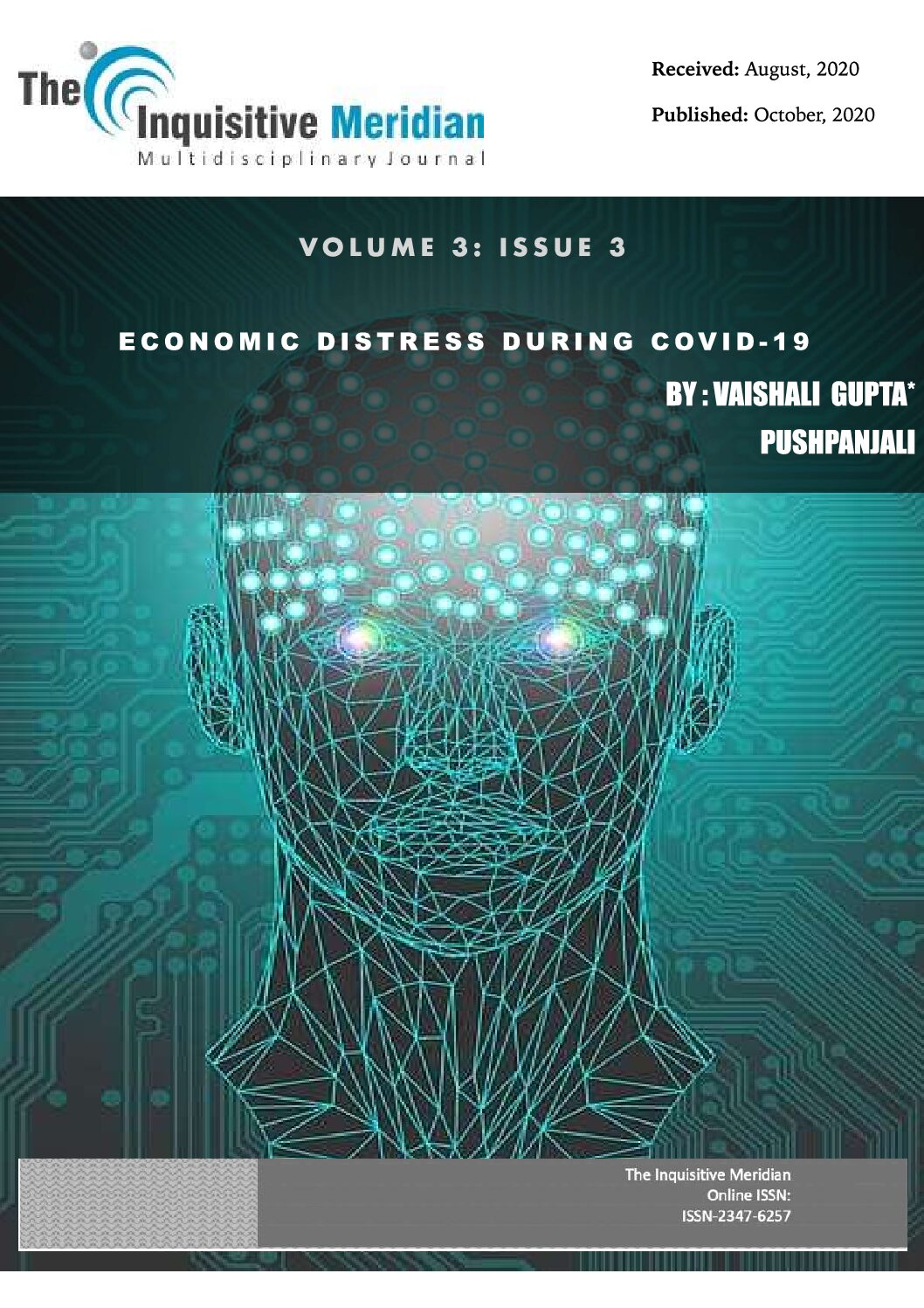
Author: Vaishali Gupta and Pushpanjali
COVID 19, the name which destroy everything in 2020 whether it is countries economic, education and so on. The entire world is in the clutch of COVID 19 and it is a virus called Corona virus. The dissemination of the virus is so colossal that it compelled the World Health Organisation (WHO) to declare it as pandemic. The outbreak of the virus has unprecedented implications on the global economy. Severe economic burden and grave consequences have to be borne by the Indian industries in this backdrop of declining economic situation due to corona virus. Thus, this article is intended to study the repercussions of corona virus on different sectors of Indian economy and to highlight the reasons for which India can be benefitted in the post pandemic period and mainly to specify the business survival strategies which is the key to overcome this tough situation.

Author: Yash Gangwani and Tanishq Suneja
The COVID-19 pandemic has disrupted business activities all over the world. The Mergers and Acquisitions sector has also been affected by this pandemic. It was expected that M&A business activity will ascend in 2020 but since the outbreak of the COVID-19 things have changed dramatically, thus impacting the deal environment significantly. It is believed that this pandemic will lead to several changes in the normal process of the M&A deal and there would also be fundamental shifts in the M&A domain. From the process of due diligence to the clauses in the contract, everything is being affected. This pandemic will crop up various challenges like delay in M&A deals, valuation, documentation, etc. perhaps, it will have an intense short term effect on M&A market but M&A will re-emerge as an important unit of operational and strategic growth. The M&A market can work smoothly only after the cooperation from all the participants of the deal and it is hoped that the M&A market will soon come back to a normal state. This paper goes in-depth to analyze the challenges faced by the M&A market in this crisis and assess the corresponding response by the stakeholders. The focus of this paper is to highlight the key impact of COVID-19 on M&A.
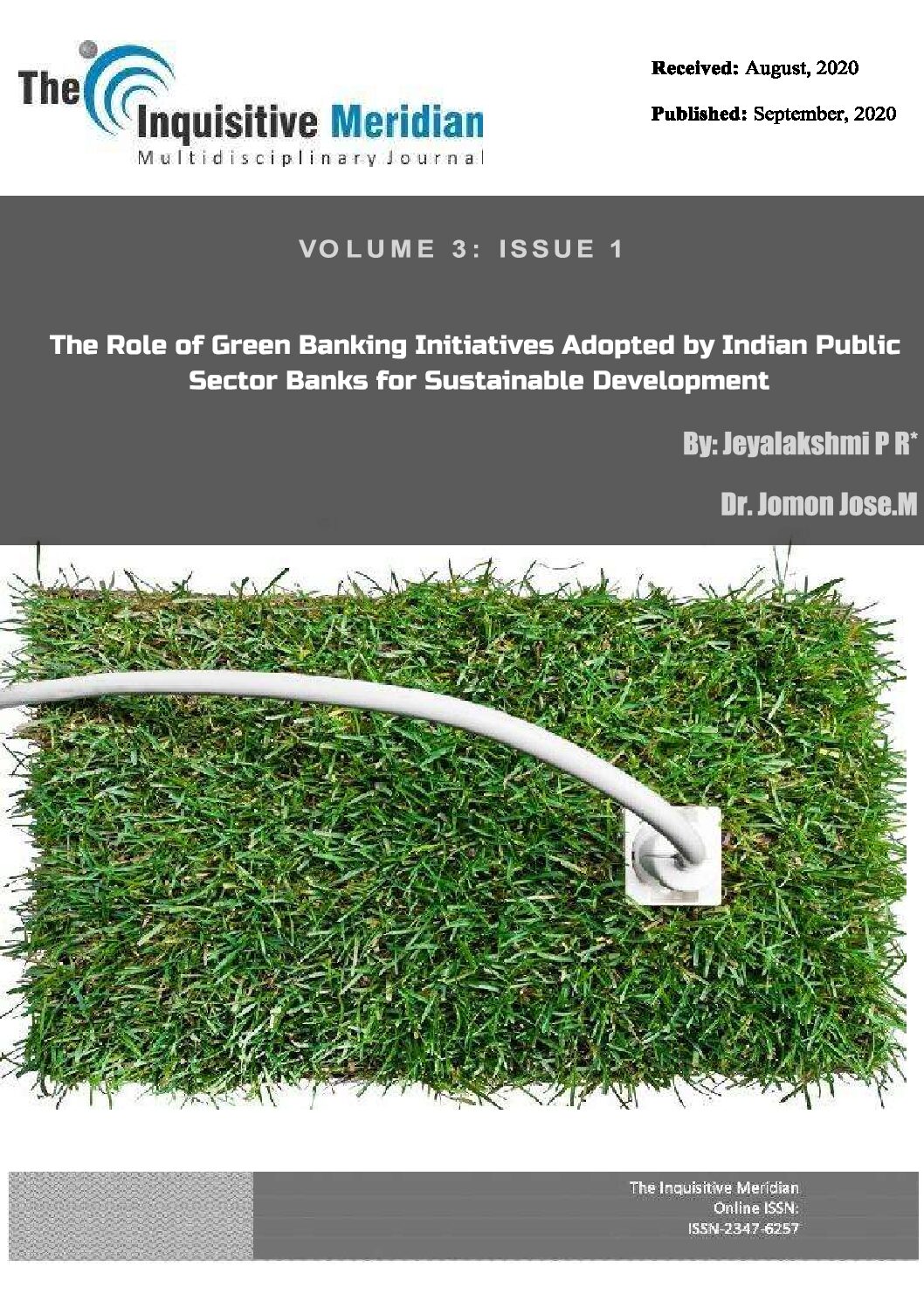
Author: Jeyalakshmi P R, Dr. Jomon Jose M
In this current period of Globalisation, thinking about the entry of 21st century, we feel that the greenery is draining with the ascent of outflow in our environment. “Green Banking” is a rising idea which is turning out to be need of hour. “It is only endeavour to consolidate the usable improvement, innovation and interesting customer propensities in the matter of banking. The banking parts have a critical job in the Economic advancement of a nation. Significance of finance in growing environment on well-disposed innovations which address concerns in regards to the environmental assurance is presently known to the world. On the off chance that the bank encourages financing of ventures in territories of renewables and clean tech, it assists with building up the innovation and cut down the cost. Bank investigates two dimensional methodology in environmental preservation initially is to decrease the environmental effect of its own tasks and second is to advance eco-accommodating advances through its loaning business. In this article, the researcher attempt to highlight how green banking philosophy helps the retail banking in achieving sustainable developments and to evaluate the influence of green banking orientation for the banking practices. The research is conducted at public sector banks in India viz, State Bank of India (SBI), Punjab National Bank, Bank of Baroda and Canara Bank. The researcher has chosen 150 respondents of public banking sector as sample. This research has been conducted utilising the actual data with the help of a questionnaire based on the literature extensively written on green banking and sustainable developments, to develop a viable model to explore the green banking dimensions, which lead towards the sustainable developments of public sector banks in India. Findings indicate that green banking and all its dimensions have significant and positive associations with sustainable developments. The results are discussed in terms of its contribution to the upgrading of banking practices and recommendations for future research.
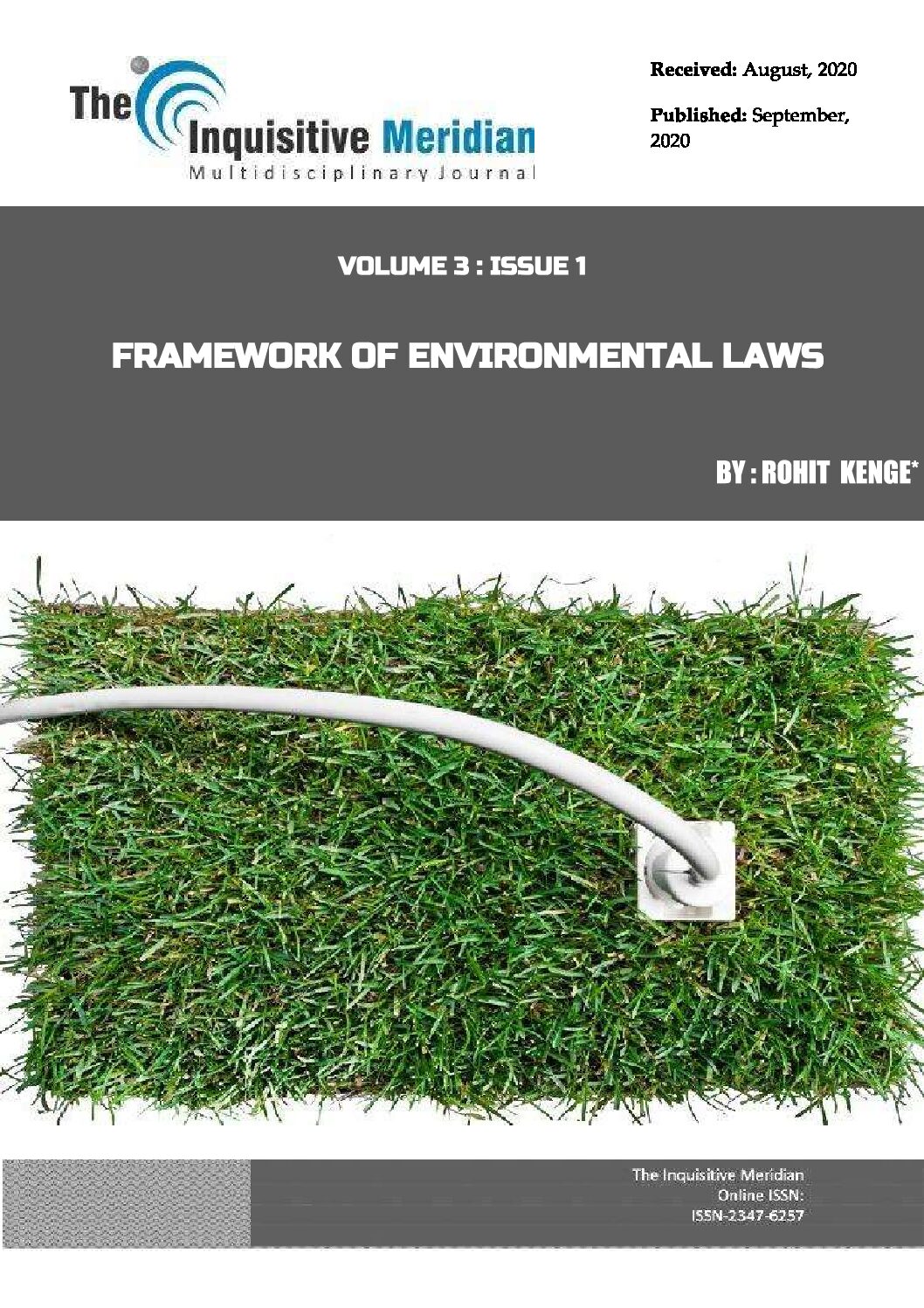
Author: Rohit Kenge
In recent years, we have seen a change in the understanding of people that there is a relationship between financial growth and quality of environment jointly with a broad awareness on environmental issues. The Indian culture promotes a focus on environmental wellbeing and the requirement for preservation and continuous utilization of three thousand years old habitual wealth and is added in the law, parliamentary work, and national environment policy structure with some international commitments. In this study, we tried to understand the basic concept of the Environment, Environment Law which is attempting to protect the Environment. We further tried to understand the nature and complete scope of the Environmental law in India’s prospect. The environment is mainly gets destructed by Pollution; Pollution is the mixing of a polluting or poisonous substance into the environment that makes the environment impure and results in an adverse effect on nature. Pollution is classified based on affected elements of the environment namely air, water, and land. We tried to study the mechanism to protect the environment and found that the Indian law system has guided about the separate authorities towards environmental protection of the State and Central governments. Environmental protection is practiced through a voluntary environment protection agreements, ecosystem approach, etc. we also studied the ash disposal strategy by NTPC, India in detail. Further, We studied “The National Green Tribunal Act, 2010 (No. 19 of 2010)” also known as NGT act had been deployed having a key objective to allocate for creation of a National Green Tribunal (NGT) for the efficient and speedy discarding of issues related to forest safeguarding, environment protection, and other natural assets. Finally, we conclude that it is a responsibility of every Indian to protect and improve the environment including rivers, lakes, forests, and wildlife, further, we must try to follow the rules deployed by the Indian legislation to protect the environment at the same time we should come with innovative ideas to reduce or eliminate the environmental pollution.
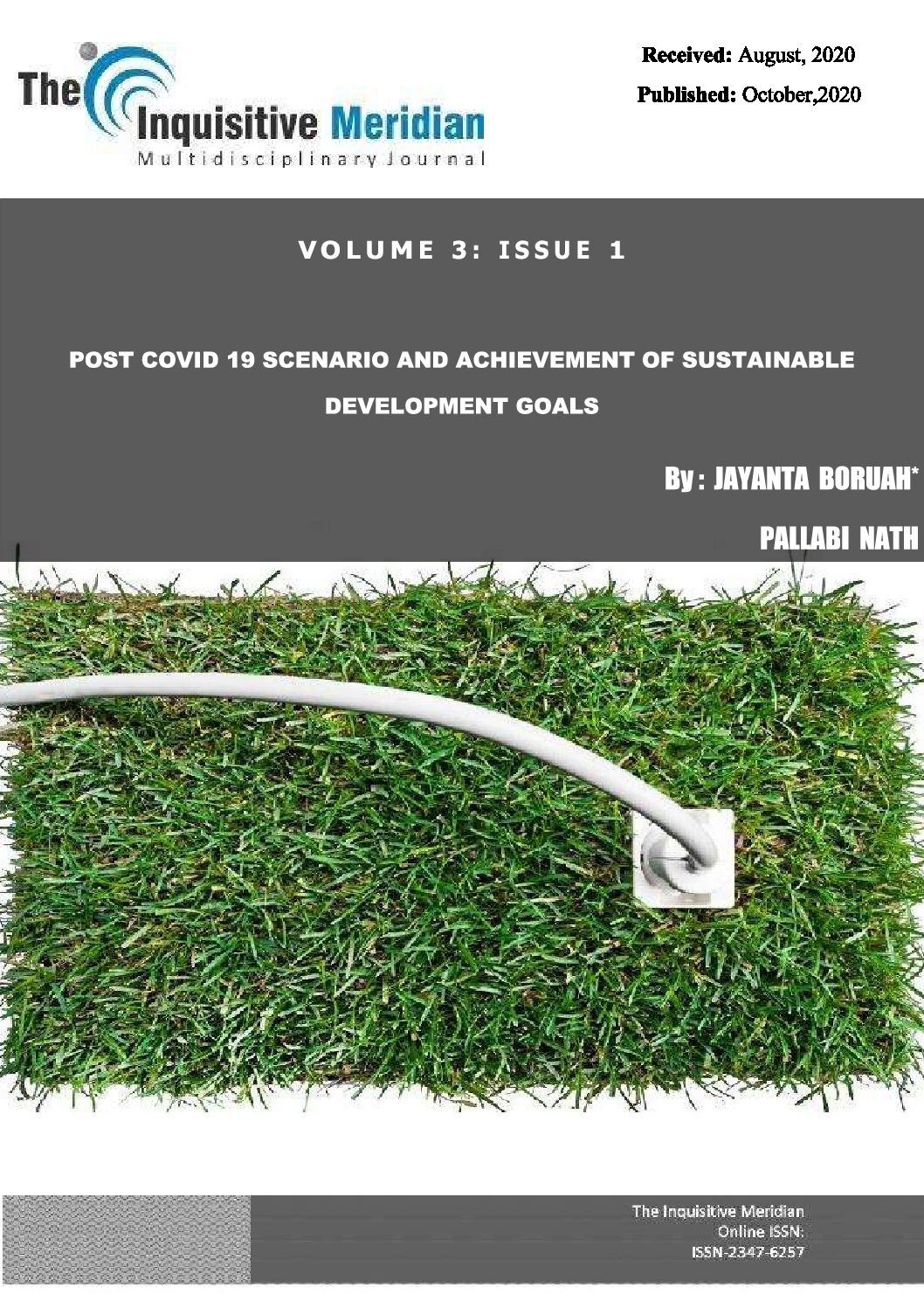
Author: Jayanta Boruah and Pallabi Nath
As the entire world fighting a war against the deadly Covid-19 which has caused a massive disruption of social, economic and environment aspects of humankind. Not only the pandemic called for an unprecedented health emergency, it also caused great disparities of the surrounding natural environment. At such situations, what catches our sight is the Sustainable Development Goals adopted by 193 member nations of the United Nations Organization, which is blue-print of 17 goals expected to be achieved by 2030. The acute destruction caused by the pandemic in one hand and the action plan to be fulfilled within ten years is so far sceptical. How and why the global goals with 17 holy ambitions as yet seems impossible is what this paper discusses. This paper aims to draw a brief sketch on the goals in terms of the covid-19 pandemic situation and also discusses suggestions to improve the post pandemic consequences in all aspects of life including social, economic as well as environmental, so that achieving the goals can still be possible.
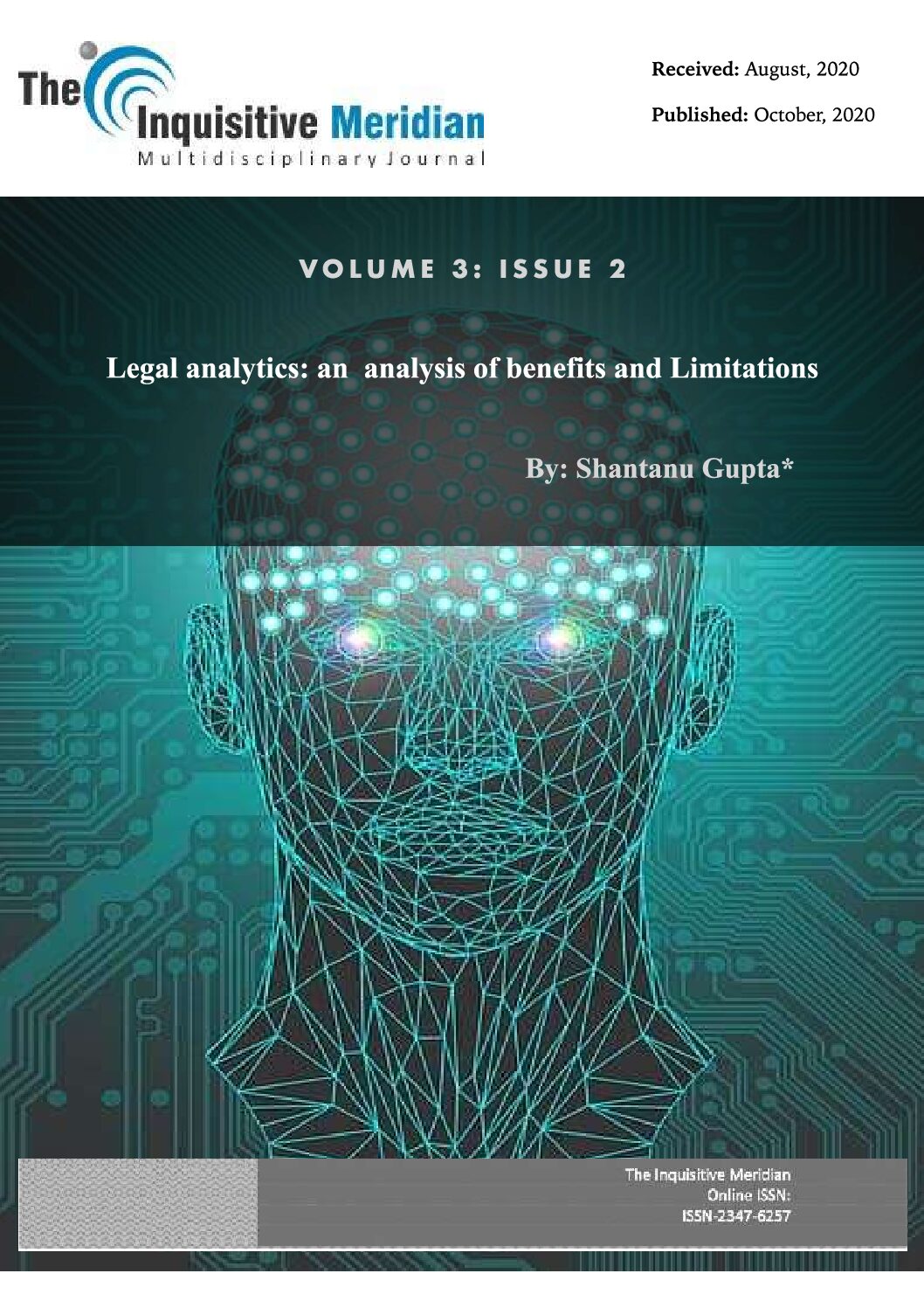
Author: Shantanu Gupta
Artificial intelligence has started assisting lawyers with different tools like predictive technologies based on the computation of big data and how it affects the job done by the lawyers. The article discusses the abilities of litigation analytics. In part, I, the continuously growing interest of lawyers in data analysis, the need for exploiting the data in litigation and as well as the classification of legal analytics is discussed. In part II, the article emphasises on the use of litigation analytics in law and its benefits to lawyers. In part III, the article threw some light on the various pitfalls of litigation analytics. At last, Article has been ended with the conclusion that lawyers should accept the invasion of AI to keep a pace with ever-growing technology.
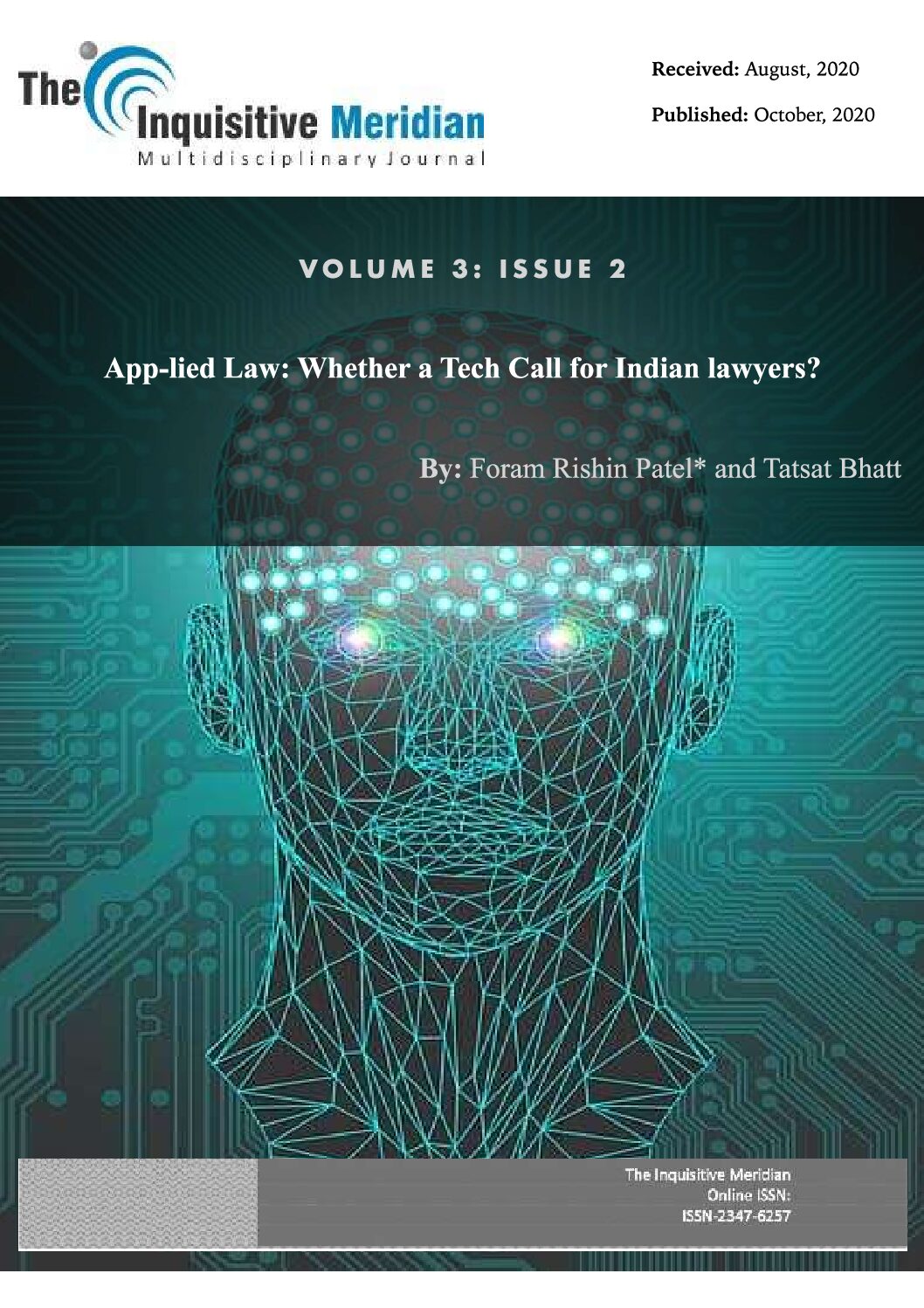
Author: Foram Rishin Patel and Tatsat Bhatt
Improvements in information technology give a reference banters about the idea of contemporary social change. For certain onlookers, 1 information technology is modifying the texture of present day specific, and it supports a lot of basic changes radical break with prior types of society and result in new open doors monetary development and social advancement. In the developing ‘information and information are treated as the centre monetary factors prevailing social on-screen characters are viewed as the individuals who process information agreement with arranged assemblages of information. Different observers dismissed this idea of the ‘information society’, pointing coherencies among over a significant time span types of society. This article aims at understanding the need of the hour considering the shift of legal work on the technological platform.

Author: Nishtha Kheria and Varun Vikas Srivastav
The business models of many law firms or we can say the legal profession as whole is experiencing a considerable change since the day the law firms has adopted the technology for their work in fact it consists of services which do not require legal education but require data procession. Legal technology or legal tech consists of lots of solutions at various levels for both the lawyers and the clients. Legal technology has turned out to be an essential element of competition within the legal market. This paper will highlight the superiority of the legal technology in comparison to the traditional firms. By using legal technology, a lot of advancements can take place. Through the use of technology legal services have turned out to be more affordable and are easily accessible to all because the lawyers are experiencing a relaxed working environment. Coming to the law schools then the main subject for this paper would be the specific treatment of the support for the law teachers so that they can conduct legal and socio legal researches. The Indian law teachers needs to be inspired to use the readily available technology and should contribute more interactively to the legal education reforms. The internet technology available in a courtroom can be configured without the parties to spend extra money on the additional hardware’s and software’s. The lawyers and the judges deal with the data because of which it is possible to create high technology courtrooms and the virtual courtrooms. The virtual courtrooms would replace the traditional ones and even the tribunals. The traditional places of the law and judgments will experience a new form of virtual evidence and the adjudication. However, we have an opportunity so that we can build a technology which will be specialized in virtual courtrooms.
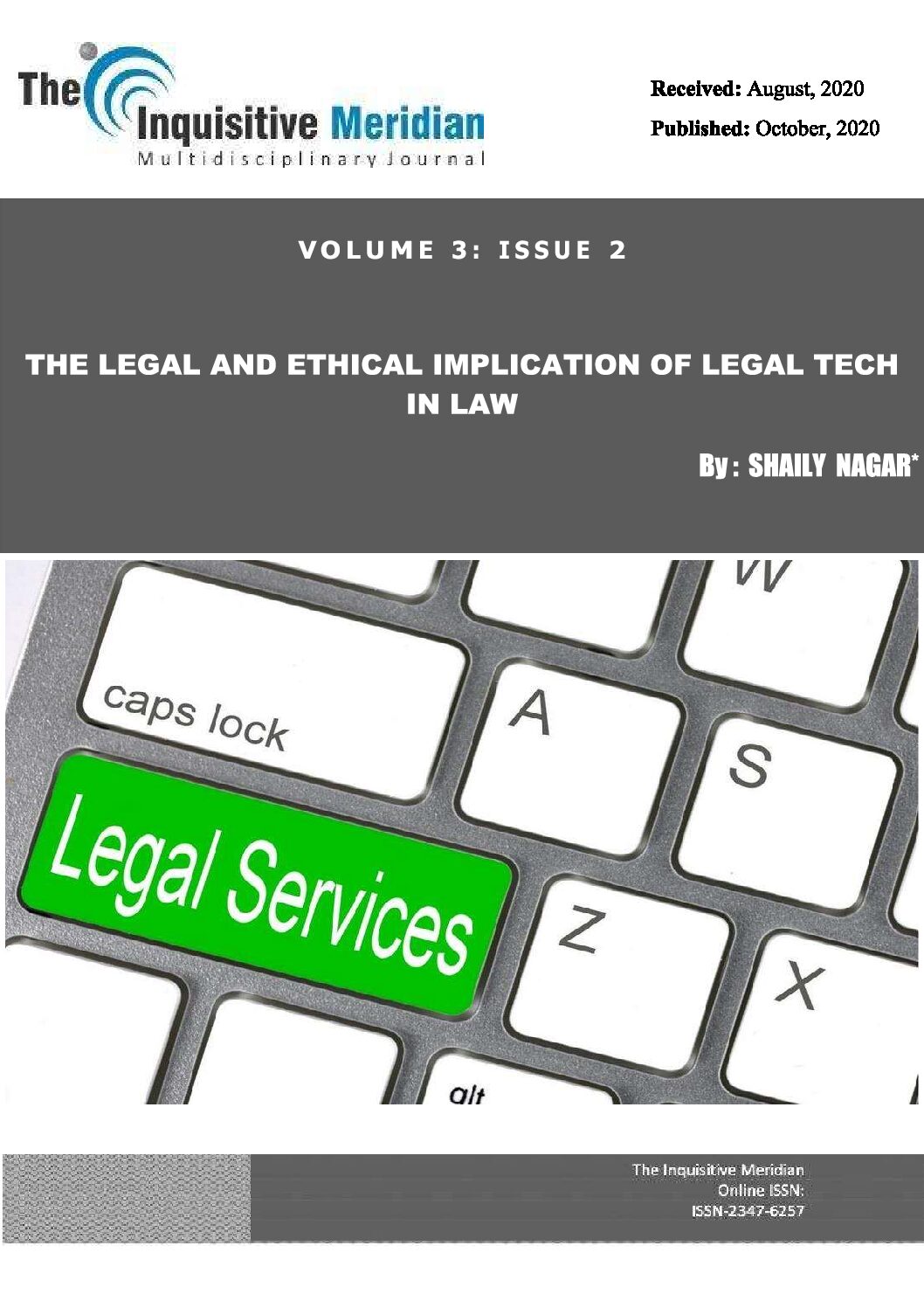
Author: Shaily Nagar
With the advent of legal technology, the legal profession will be facing a paradigm shift since the work undertaken in this profession is mostly in the form of data procession and analysis. To understand the consequences that this shift will bring, this article seeks to highlight and discuss, what all legal and ethical implications will law as a field will face in the wake of rapid legal technology advancements. In Part, I, the continuous growth of computer power has been described to show that this growth is not a one- time event instead it is an everlasting effect that will dominate a greater territory. In part II, this article sheds some light on the current legal technologies with the primary aim to understand the legal implications that these technologies will create. In part III, this article discusses the ethical implications of using legal technology and suggests changes required in present rules to keep pace with technology. At last, the article has been concluded on a note that both the lawyers and the rule makers have to ameliorate.
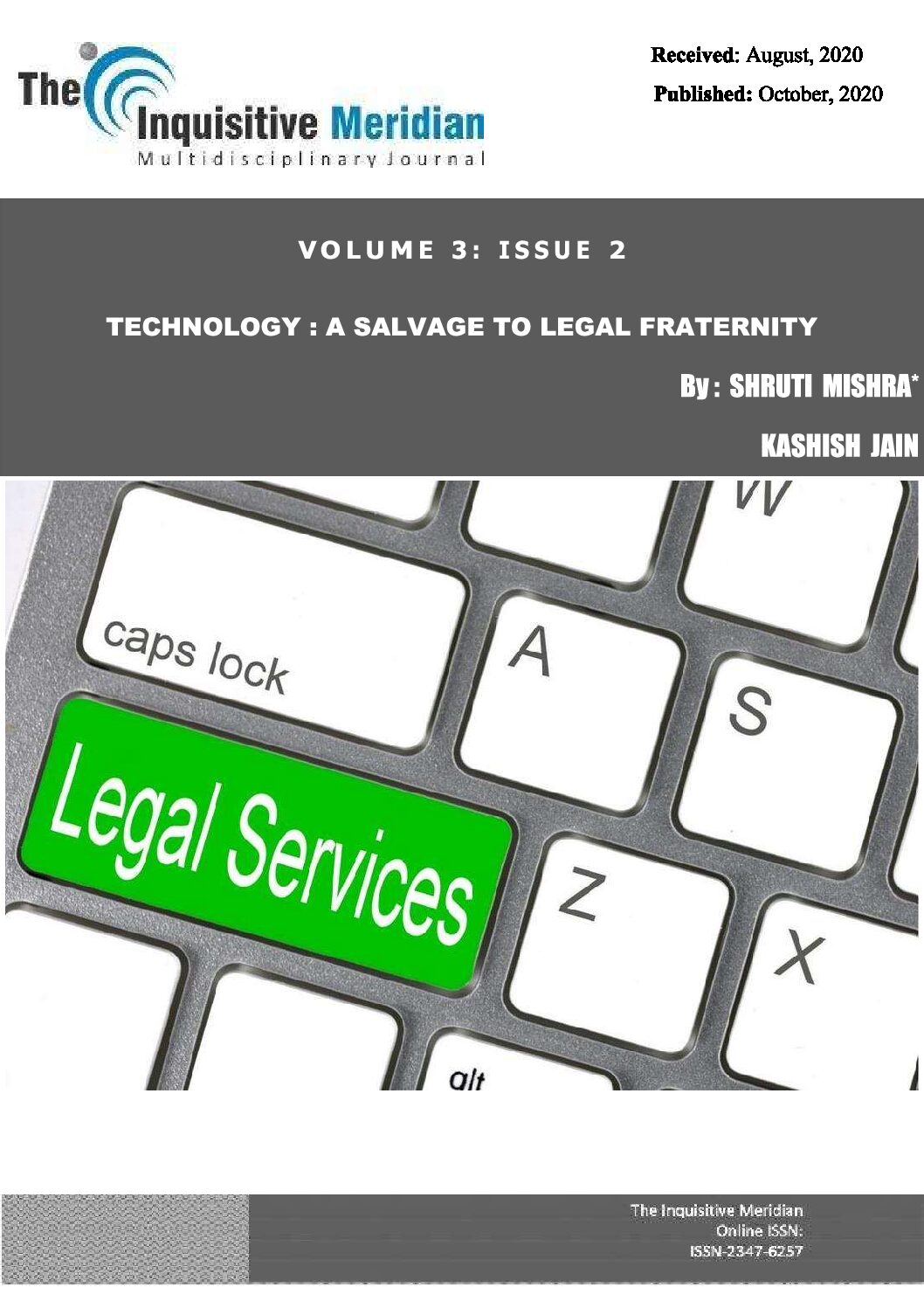
Author: Shruti Mishra and Kashish Jain
The Covid-19 crisis and the disruption to lives and livelihoods that have followed have had a spectrum of affects upon individuals, including the people who make up every law firm. It will take a long time for employers to understand and then respond to all of those affects. Technology has had a crucial role to play in enabling people to keep working and earning. Being the sector lacking behind in running trend of technology, Now is the time, we believe, when all firms must begin to review where they have landed on the technology road map and what to do next to secure and deal with those open risks and issues. The pinnacle to get aware of about all the possible techniques we could adopt during this pandemic to stand with all our efficiency and deal with the current situation with utter intelligence. The research talks about the use of technology, various applications; software’s which already persist in the developing world but still not accepted by us. It further explains different activities performed in legal sector and the inclusion of technology to give it a seasoning of modernization. It stipulates the need of replacing orthodox methods in which we are tangled to keep our survival up reducing our efficiency and proficiency.
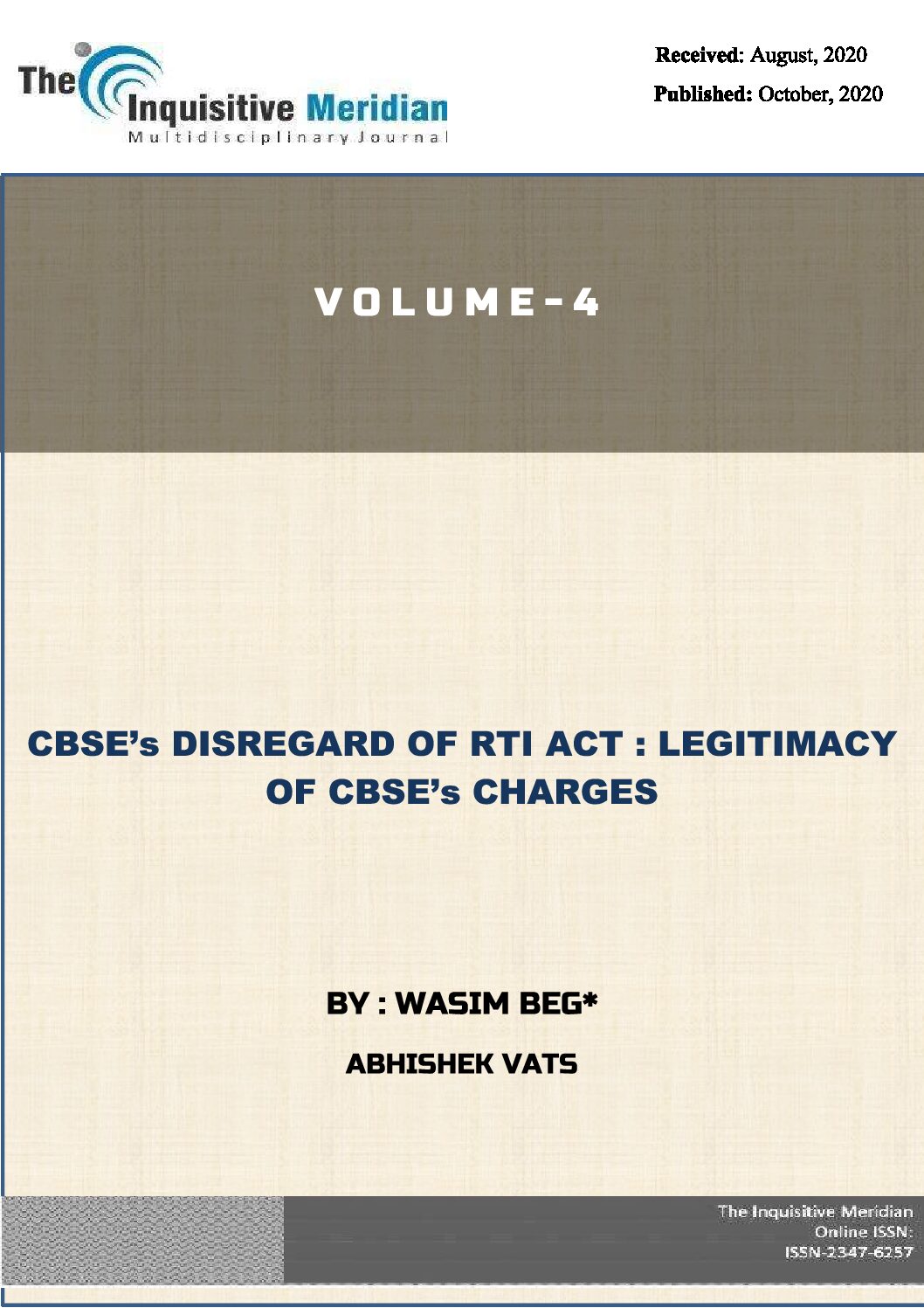
Author: Wasim Beg and Abhishek Vats
The Right to Information is recognized as a crucial part of freedom of speech guaranteed under Article 19 of the Constitution and landmark judgments of the Supreme Court have reinforced this view, time and again. The Constitutional Bench of the Supreme Court in S.P. Gupta & Ors. v. President of India and Ors.3 held: “The concept of an open government is the direct emanation from the right to know which seems to be implicit in the right of free speech and expression guaranteed under Article 19(1)(a).” Again, in Reliance Petrochemicals Ltd. v. Proprietors of Indian Express Newspapers Bombay Pvt. Ltd. & others4 , the Supreme Court recognized that the Right to Information is a fundamental right under Article 21 of the Constitution. Right to Information Act has been hailed as a landmark step in ensuring transparency in public administration and affording an opportunity to the public to hold public authorities accountable with a firm grip. Section 3 of the RTI Act, 2005 provides that all citizens shall have the right to information (subject to the restrictions mentioned within the Act).5 The term ‘right to information’ is defined under section 2(f) as, “information accessible under the Act which is held by or under the control of any public authority6.” Therefore, Section 3 holds that citizens have the right to access/demand the information held by any public authority only and not against private individuals. According to The Right to Information (Regulation of Fee and Cost) Rules, 2005 a fee of Rs10 is charged along with the RTI application. The RTI Regulation of fee and cost rules further provide that persons below poverty line need not pay any fees under the RTI Act.
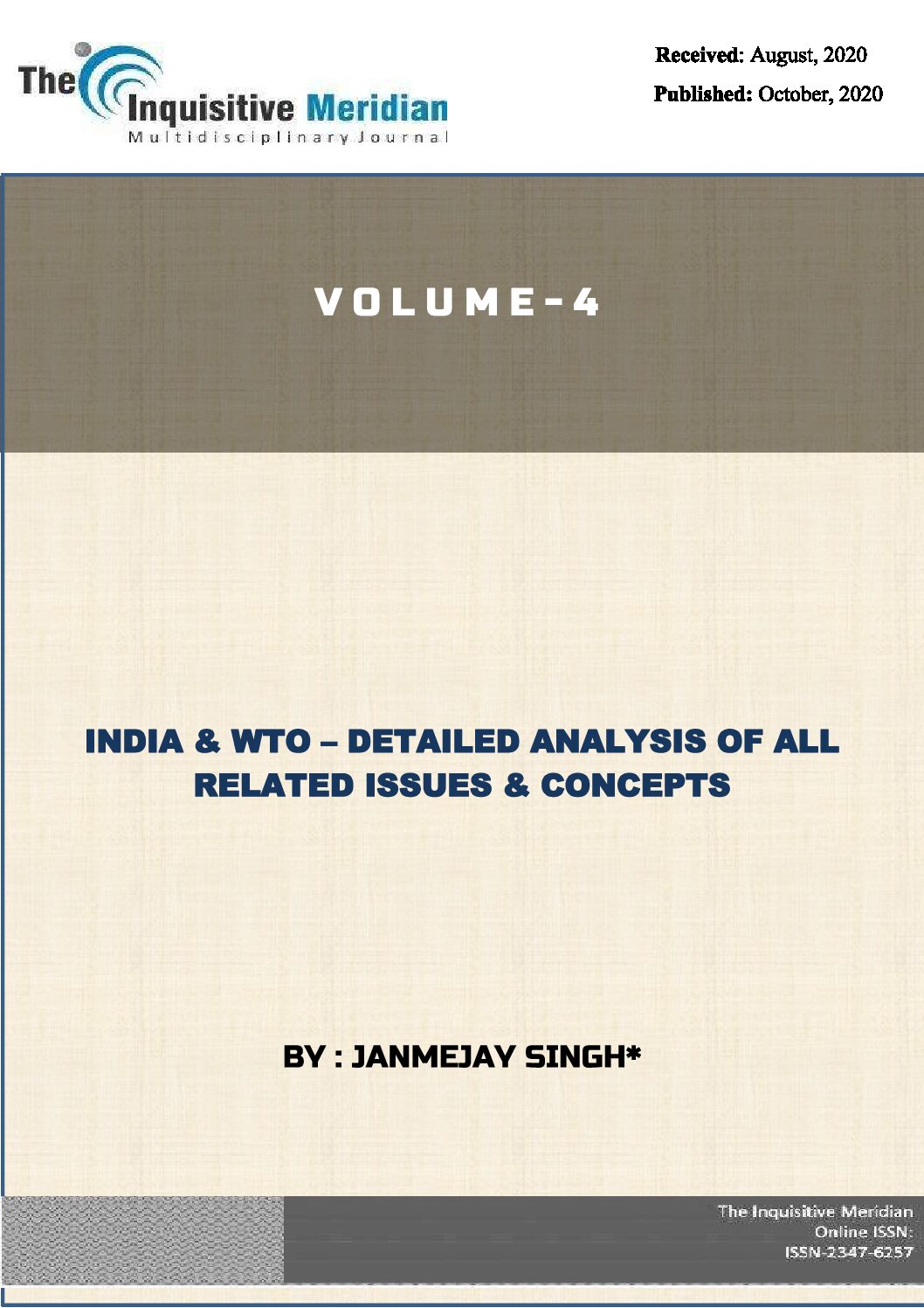
Author: Janmejay Singh
The entire world has been severely impacted by the unexpected outbreak of the COVID-19 Pandemic. As the effect of this pandemic Indian legal system are facing historically significant challenges regarding Law and Order. The Outbreak of Covid-19 is already disrupting in Profound Ways. The Pandemic has created an enormous amount of uncertainty as the People are facing an unenviable decision whether to close or Open his work. Work from Home in the Present time of Epidemic this has become the norms and a standard work Practice. The Labour Regulations in India do not Consider work from Home as norm. At present, there is a lack of specific Legislative Framework enabling Work from Home. What about right to work , Health, Food, shelter. 16 Migrant workers run over by Goods train near Aurangabad In Maharashtra this is the Condition of Labour in India. Main legal weapon The Epidemic Diseases Act 1897 is a Law In India For the implementation of Containment measures to Control the Spread of the Disease. The act does not provide any power to the Centre to Intervene in Biological emergencies. It has to be substituted by an foreseeable Public Health Needs, including Emergency Such as Bioterrorism attack International Spread Of Diseases. The legal Inadequacy to tackle disease Outbreak at the end of the day Country was not ready.
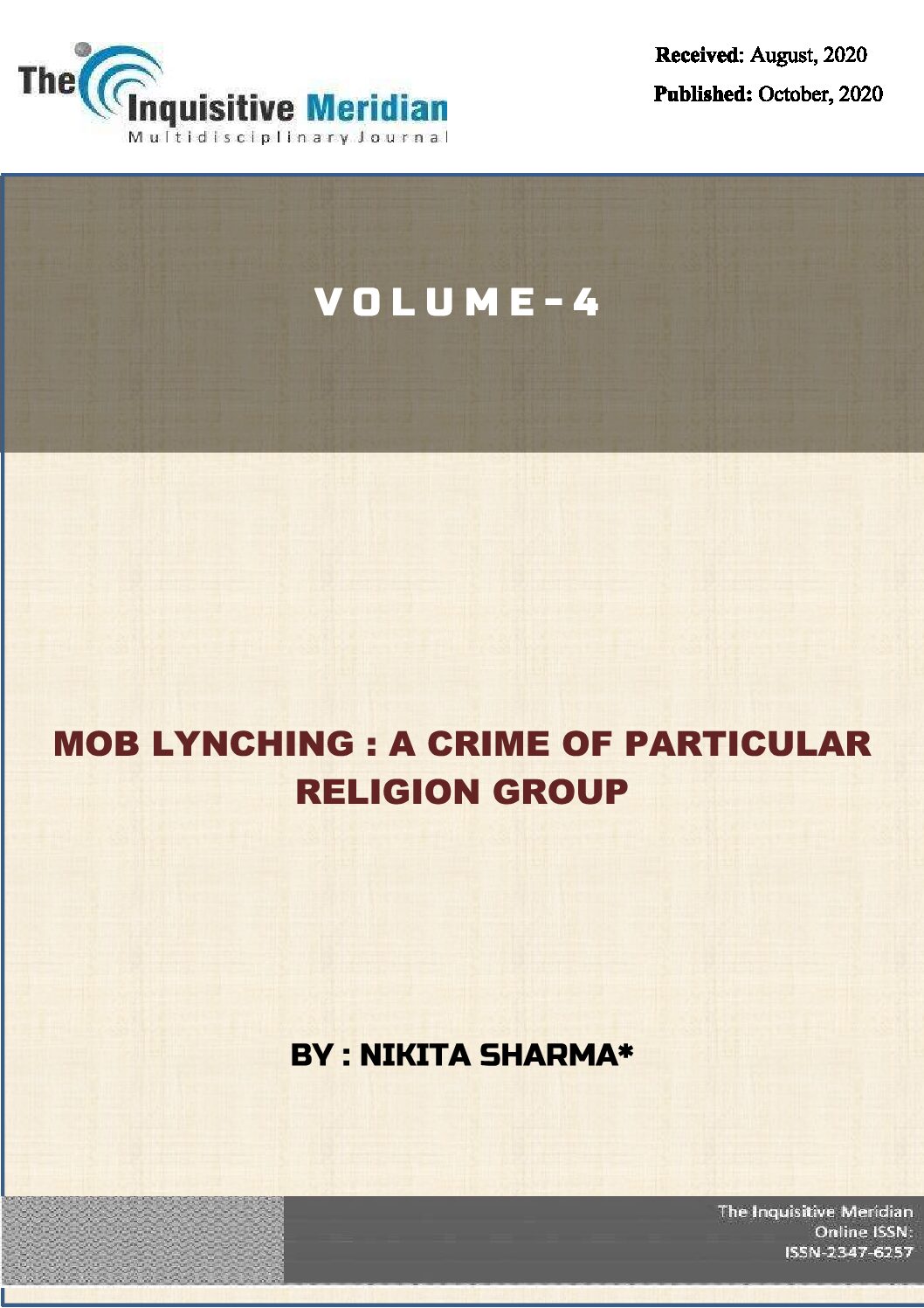
Author: Nikita Sharma
Article 21 of the Indian constitution guarantees to every person his life and liberty which can only be deprived according to procedure established by law. In our society, two of the worst crimes are rape and mob lynching. Here in this research paper, we are going to discuss about the mob lynching. India has been an observer to various phases of lynching. Lynching of Dalits and women has been done as an issue of option for option to address them or punish them for aberrance. Lynching of Muslim has been optimistic in the feeling of political philosophy. Presently we have moved to another phase of lynching as a propensity and as are flex of suspicion. This neurotic culture can lynch anybody irrespective of caste, creed, colour, and gender. In recent years, there have been numerous mob lynching cases occurrences in India, in this context, the Supreme Court in 2018 described lynching as a “Horrendous Act of Mobocracy” and laid down guidelines for the centre and state government to frame laws specifically to deal with the crime of lynching till the time it has directed to the police to register an FIR under section 153A of IPC2 and other such provision of law against those who indulge in this kind of activities. Supreme Court has also directed the Centre and state government to take ‘preventive, remedial and punitive measure” to curb it “with iron hands”.

Author: Shantanu Saharan
In this research paper I will be discussing about the various legal bodies that have jurisdiction in the matters of debt recovery. I have been working for almost two years in a Public Sector Bank as a legal Manager and have been dealing with recovery cases in DRT which has helped me get considerable insight in the issue, which I am sharing through this research about the procedure to be followed to get the order from these authorities and various powers of them. The main focus is on various judicial bodies (courts, tribunals), their establishment, the procedures followed and their powers and various modes of recovery of the debt.
Objective : The target of the present paper is to know the methodology included in the recuperation of obligations. The paper will likewise anticipate elaborate the forces of the Debt Recovery Tribunal furthermore the method of recouping the obligation under the working of the tribunal.
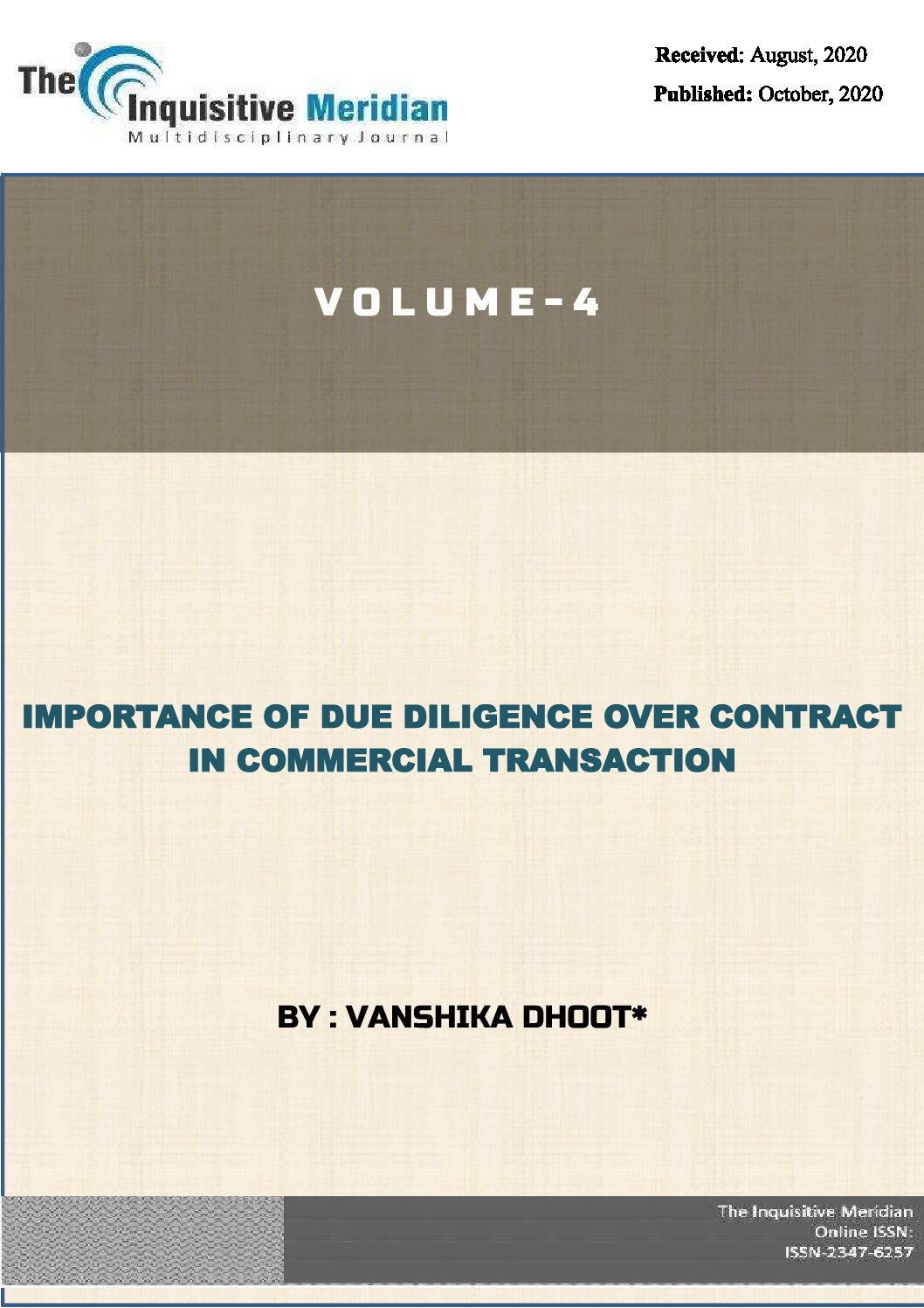
Author: Vanshika Dhoot
The researcher, in this research paper explains about the term “due diligence”. This research paper talks about why pre – transactional due diligence is necessary in today’s business world. Here, it is further explained that why it is important to adopt it as a smart move before making any transactional decision to avoid any disputes, litigation issues or arbitration procedures between the companies or parties. As the researcher made you understand about the geography of the term ‘due diligence’. The research paper now talks about two things, from which first question which arises in every person’s mind is due diligence should be mandatory before any commercial transaction or forming any contract or not? And the next question which arises in human mind is that does the process of investigation during due diligence infringes the fundamental rights or we can say the right to privacy of any person? With these research questions the researcher concludes the research paper on the topic ‘The importance of due diligence over contract in commercial transaction’.
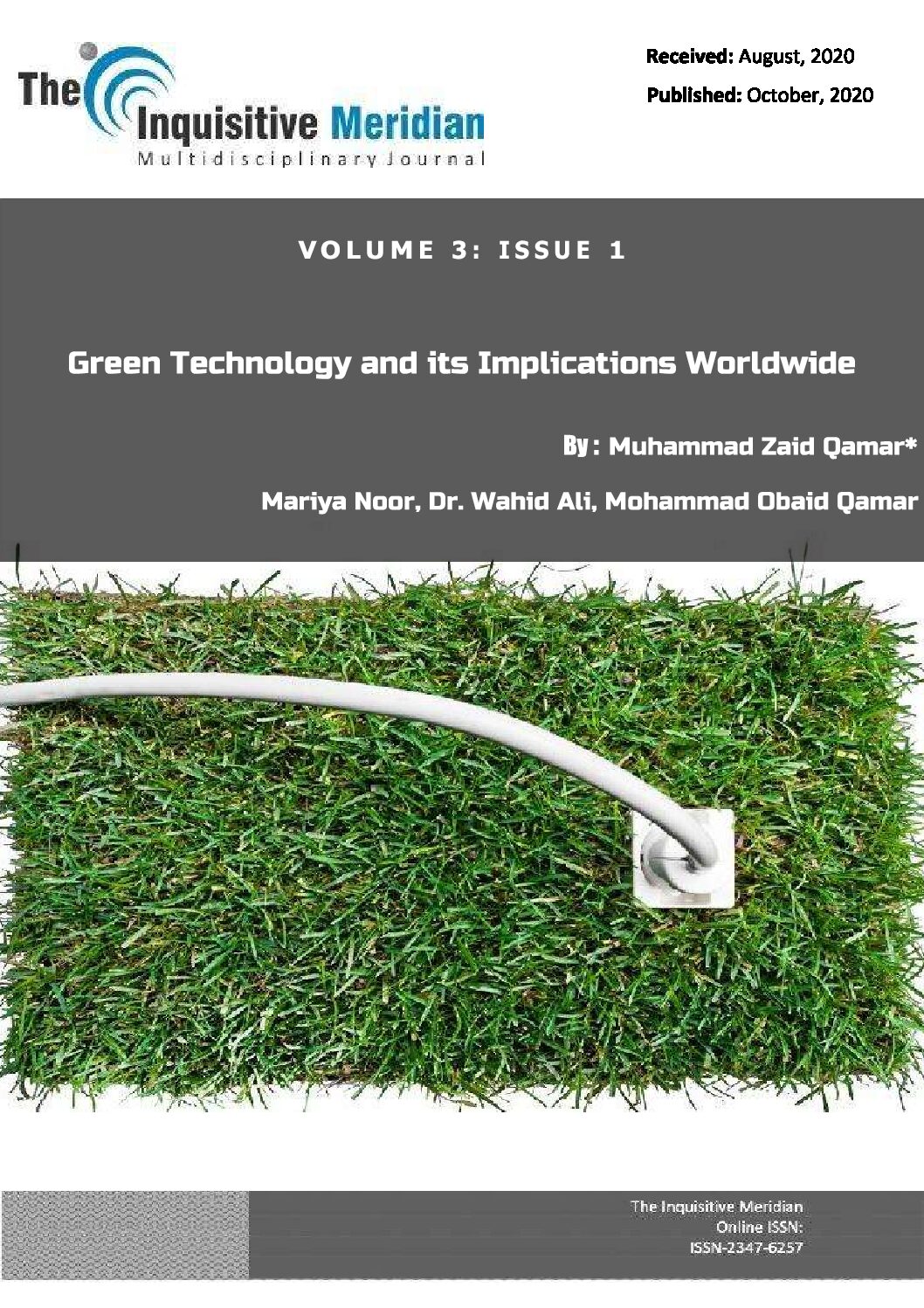
Authors : Muhammad Zaid Qamar, Mariya Noor, Dr. Wahid Ali, Mohammad Obaid Qamar
Green tech is an umbrella term that encapsulates any technology that is created to be environmentally friendly from its production line all the way to its usage. It is a continuously evolving form of technology which aims to be less taxing to the natural resources as humans are consuming the resources faster than it can be replenished. The major goal of green technology is to help control climate change, protect the natural environment, reduce our dependence on Non-Renewable resources such as fossil fuel, and heal the damage done to the environment. Few sectors that are actively investing in this technology are Transportation, Energy, Waste Management Sectors. While there are many advantages of using this technology, it needs to cross some hurdles before it can become a new normal. Over the years’ green technology has become one of the employment sectors with the fastest growth. Day after day it is getting more obvious that we need to invest more in green solutions for the survival of mankind and the necessity of green tech lies in reducing the risks posed to the environment and in conserving natural resources. As discussed in this paper, even if we have now emerging technologies for reducing emissions are available for implementation, including wind power, improved solar cells, and electric vehicles, we still need to deal with the issue of technology transfer as the developing countries produce majority of the world’s pollution, particularly CO2 and other greenhouse gases due to the careless environmental policy implemented.
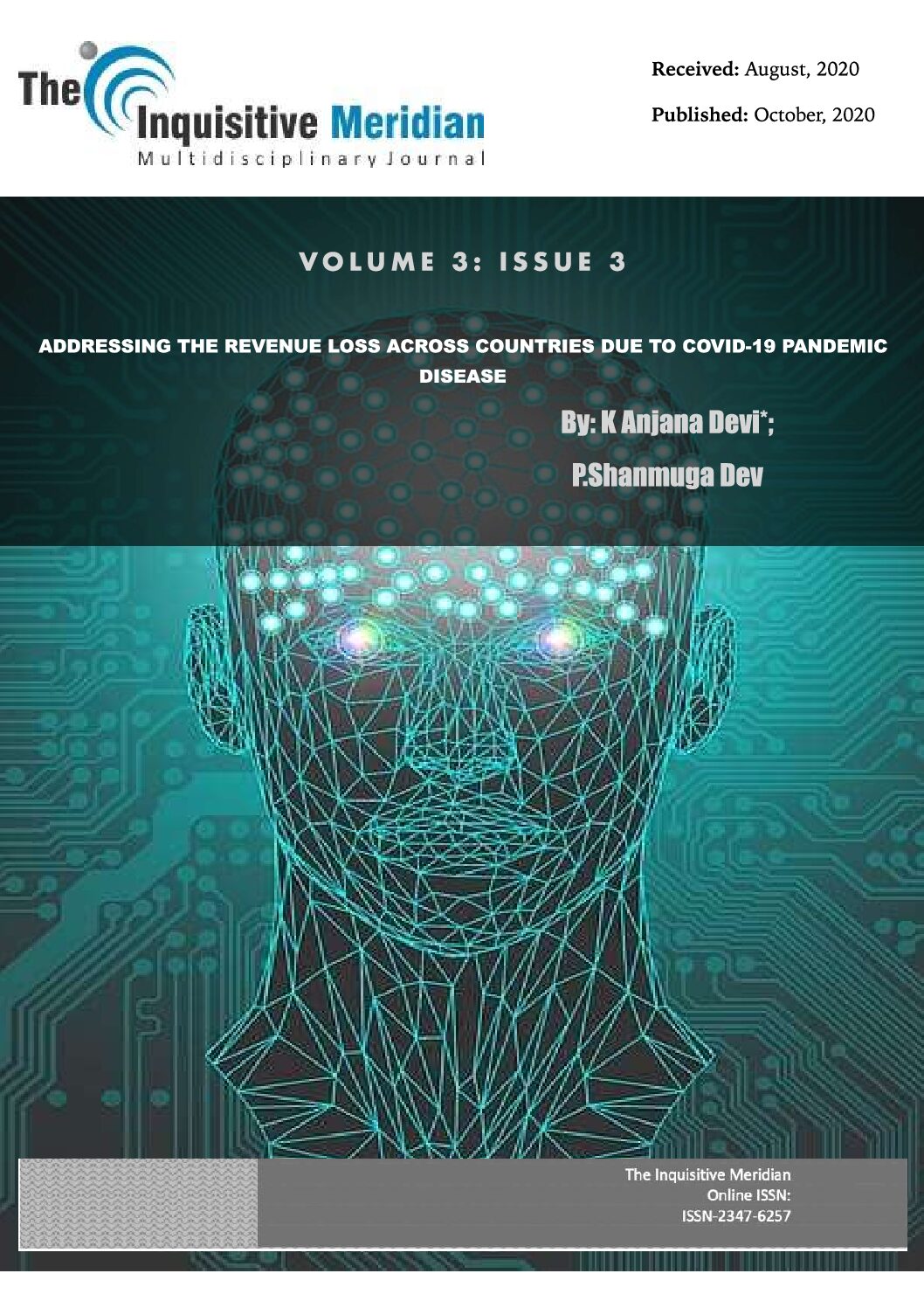
Author: K Anjana Devi and P.Shanmuga Dev
The Covid-19 pandemic is a public health crisis and global economic shock increasingly affecting low-income countries and lower middle income countries around the world. As the Covid-19 pandemic evolves, many countries are likely to experience recessions, and most are likely to see their public finances deteriorate. With the public health and economic impacts of the Covid-19 pandemic evolving rapidly, tax officials need to be ready to update their forecasts and policy responses as their country’s situation evolves. Tax policy responses to Covid-19 in lower-income countries should aim to provide targeted support, not broad-based stimulus, at least for now. The overall economic growth in India slowed to 4.2% in 2019-2020 as both exports and investment started to contract. Governments across the world look for opportunities to streamline taxation to ensure maximum coverage both in terms of sources of income and the number of people under the tax net. This paper mainly evolves with bringing into light the impacts of Covid-19 pandemic on economy. Also it aims to give a comparative study on all taxing policies brought by major countries around the world and their tax reliefs too. With reference to few reports released regarding the state of Indian economy, a clear view of economy is shown in this paper with the help of statistical data.




By signing up for this email, you are ageeing to receive news, offers and information from The Inquisitive Meridian and our partners. Click here to visit our Privacy Policy. Easy unsubscribe links are provided in every email.